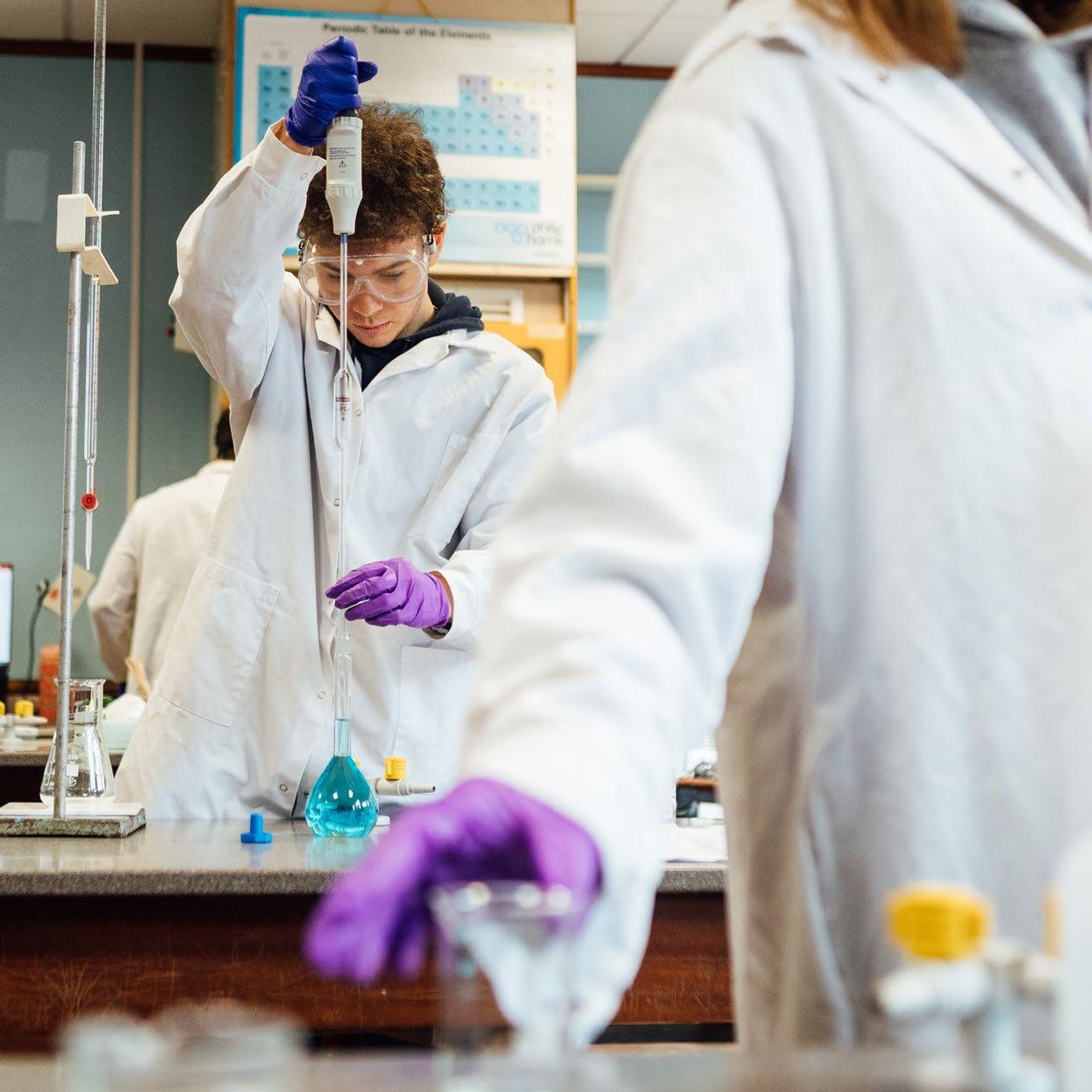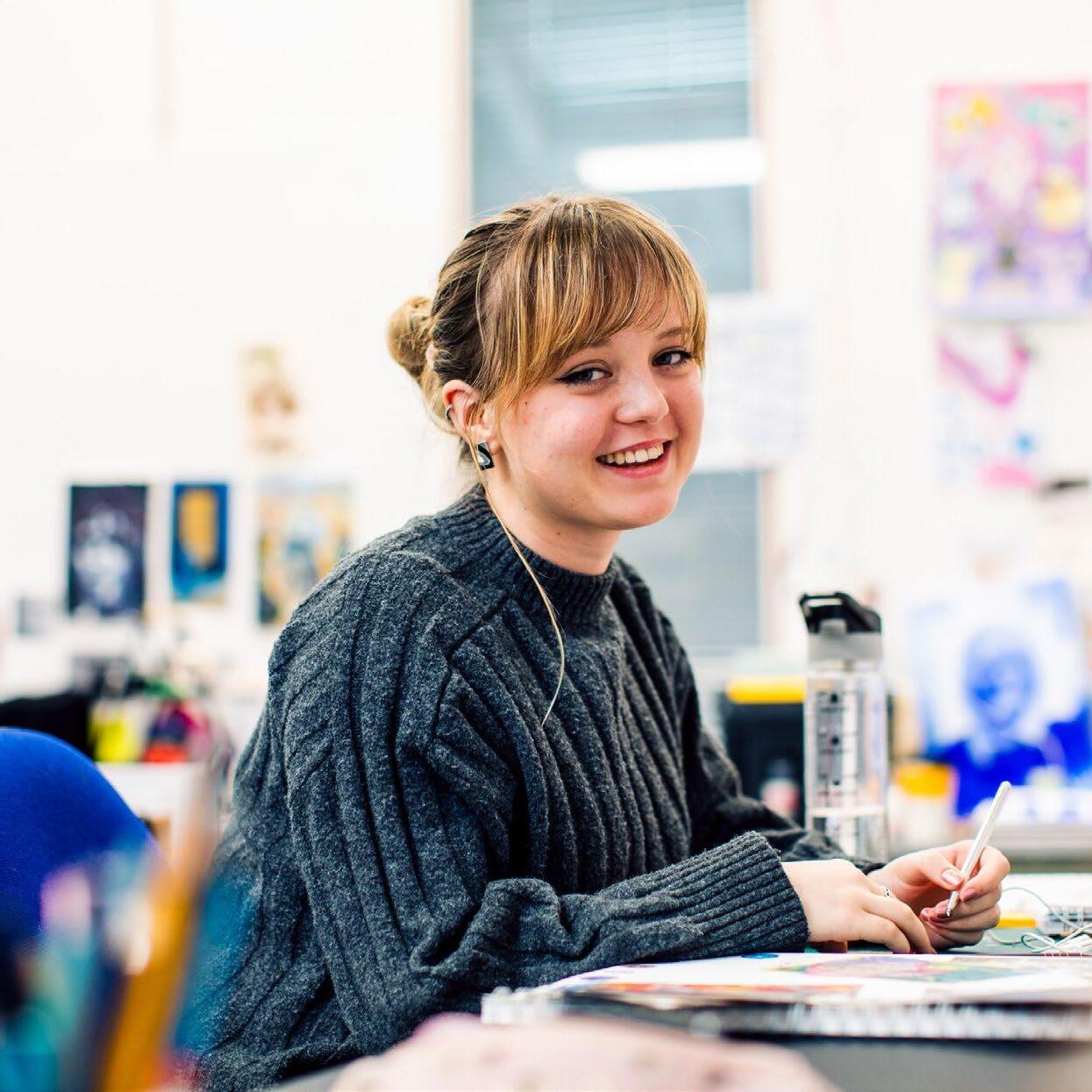

The Sixth Form at St Chris
The Sixth Form in any school represents the pinnacle of school life: the academic work is at its most challenging; the opportunities for developing one’s personality and wider social skills are at their greatest; extra-curricular activities flourish at their broadest.
It is the place too from where the horizons of the future can most obviously be viewed. The Sixth Form is the juncture at which the transition from school to university, college and the world beyond school begins.
St Chris Sixth Form is an inspiring and challenging place to learn. During the two years of Sixth Form pupils grow and develop both academically and socially, making the most of the unique environment and the many opportunities available at St Chris.
The quality of the experience of being a Sixth Former at St Chris prepares students as fully as possible for life after school. Our relatively small size ensures that students can be given outstanding support as they make decisions about university entrance – decisions which will almost certainly have a great influence on their lives. The fact that our community allows everyone to know each other very well provides them with a truly collaborative academic atmosphere.
Students have opportunities through the School Council and through roles as Major Officials to influence the way the School develops. They become aware, through direct experience, that privilege brings responsibility.
We offer a wide range of A level and Level 3 Diploma courses. Class sizes are small and students enjoy individual attention. Facilities are excellent with many specialist areas purposebuilt and equipped to the highest standards.
There is a specific Sixth Form Centre and excellent extracurricular provision for drama, music and sport.
St Chris has always been keen to promote a wellbalanced curriculum so the Sixth Form combines hard work and enjoyment.
The Sixth Form is also a time when interests widen. St Chris is an outward-looking community, and the School’s ongoing commitment to its local community, to issues of international concern such as climate change and globalisation, and to the development of independently-minded individuals, all ensure that involvement in major issues can be combined with academic work.
St Chris has a long-standing record of academic success. Through a system of dedicated and individually tailored support from Higher Education and UCAS Advisers, careers advice and bespoke support, we are able to support our students to reach their next steps. Pupils regularly gain admission to the very best universities (including Oxford, Cambridge and others of the Russell Group) as well as art colleges, apprenticeships and vocational qualifications. In 2024, 94% of pupils were offered a place at their first choice of university.
Its concern with the needs of the individual and its connections with the wider world (for example, through World Challenge trips to Borneo or Sri Lanka), mean that St Chris offers a stimulating and enjoyable Sixth Form experience with ample opportunities for success.
We have a superb record of academic success with pupils gaining admission to the best universities.
ENTRY STANDARD
St Chris views each child as an individual and our admissions process to Sixth Form takes this in to consideration. We do expect our prospective Sixth Form pupils to obtain at least 5 GCSEs at grade 5 or above in order to follow an A level programme, with at least a grade 6 in the subjects selected for study at A level, or in relevant subjects where a student is starting a subject from scratch, such as psychology, business, or politics.
Those without GCSEs (for example, those who may have followed an overseas curriculum) will need to demonstrate suitable ability.
ACADEMIC PROGRAMME
The majority of students study three or four A levels or Level 3 Diplomas in the Lower Sixth (Year 12), often in combination with the Extended Project Qualification (EPQ).
CHOOSING A STUDY PROGRAMME
PUPILS ALREADY AT ST CHRIS
For pupils already at the School, the process of deciding which courses to take starts in the November of Year 11 (V Group) with the Sixth Form Information Evening, followed by a series of support sessions through the PSHE programme and their Head of Year and Company Adviser.
During this process students can take time to consider and discuss the subjects available and begin to consider their subject choices.
Most students are motivated to take a subject because they find it interesting or they have a personal aptitude for it. Students should also bear in mind their possible future plans for university courses and careers. For example, if you are thinking of studying medicine at university, it is essential to take Chemistry A level.
At the start of Lower Sixth there is an Induction Conference on the day before the start of term in September. Students will, by then, have received their GCSE results. The Conference provides a further opportunity to meet with subject teachers and receive advice and guidance.
PUPILS JOINING ST CHRIS
For pupils who are joining St Chris for Sixth Form, we offer bespoke tours, a meeting with the Assistant Head (Sixth Form), and the Heads of Department of subjects you are interested in studying. You will discuss and explore your A level choices with a senior member of staff, and will also receive further advice and guidance at the Induction Conference and during the first two weeks of term in Year 12.
Please be aware that the timetable is set in the Spring term prior to the start of Sixth Form, and from this point subject blocks are set.
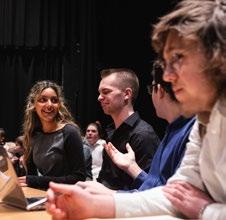
A Level
Subjects Offered
Art & Design: Art, Craft & Design
Art & Design: Fine Art
Art & Design: Graphic
Communication
Art & Design: Photography
Art & Design: Textile Design
Art & Design: Three-Dimensional
Design
Biology
Business Studies
Chemistry
Computer Science
Core Maths (Equivalent to AS Level)
Drama and Theatre
Economics
English Literature
Film Studies
French
Further Mathematics
Geography
History
Mathematics
Music
Philosophy
Physics
Politics
Psychology
Spanish
Diploma (Level 3)
Subjects Offered
Digital Music Production (BTEC)
Food Science & Nutrition (Diploma)
Performing Arts (BTEC)
Sport (BTEC)
SUBJECT COMBINATIONS AND SUBJECT BLOCKS
Subject blocks are set annually to ensure that the maximum number of students have their desired combination of A level subjects. However, due to staffing and timetable constraints we cannot guarantee to provide all combinations of subjects.
It is also possible that courses will not run if the level of interest is low. If this is the case, the School may make the decision to withdraw a subject prior to the start of the school year and will inform pupils and parents accordingly.
ENTRY INTO YEAR 13 (UPPER SIXTH)
Lower Sixth students do not have an absolute right to progress to the Year 13 (Upper Sixth). Progression depends on satisfactory performance and evidence of good work habits, approach and determination in the Lower Sixth year. St Chris has always taken pride in pupils who work hard and display positive attitudes to the wider life of the School.
SUPPORT THROUGHOUT SIXTH FORM
Joining the Sixth Form is an exciting time. However the academic step-up from GCSEs, and the increased focus on independent learning can lead to it being a time when some pupils feel uncertain and a little daunted. To combat this, St Chris offers a personalised and detailed support programme for each pupil, to ensure that they thrive within the Sixth Form environment.
Pupils are allocated a Personal Tutor and the partnership between tutor and pupil forms a central relationship, with the tutor guiding, advising and acting as a critical friend and supporter. Pupil support is on-going and comprehensive with Personal Tutors keeping a close eye on the well-being of the pupils in their care. They also meet formally once a week to review both pastoral and academic progress, and liaise with parents/carers, giving updates and specific targets. Tutors help pupils settle into Sixth Form, encourage them to become responsible independent learners and to participate in the wide range of opportunities available outside of the classroom.
Students are also supported by the Assistant Head (Sixth Form) and the Head of Year 12 and Head of Year 13.

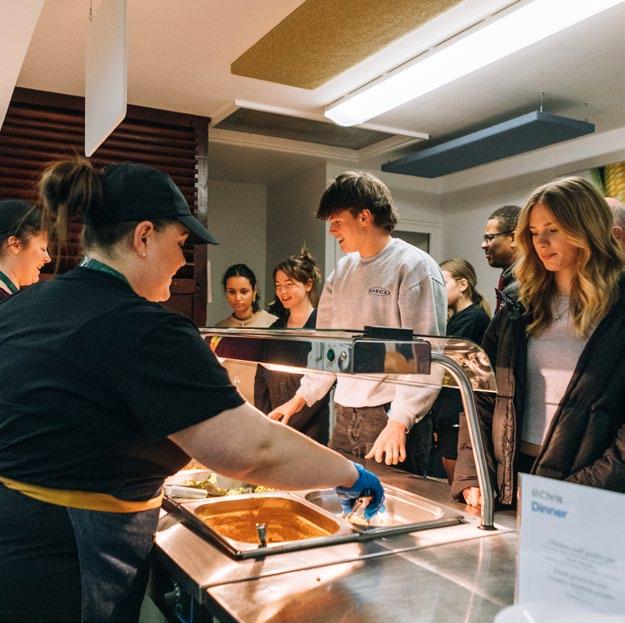
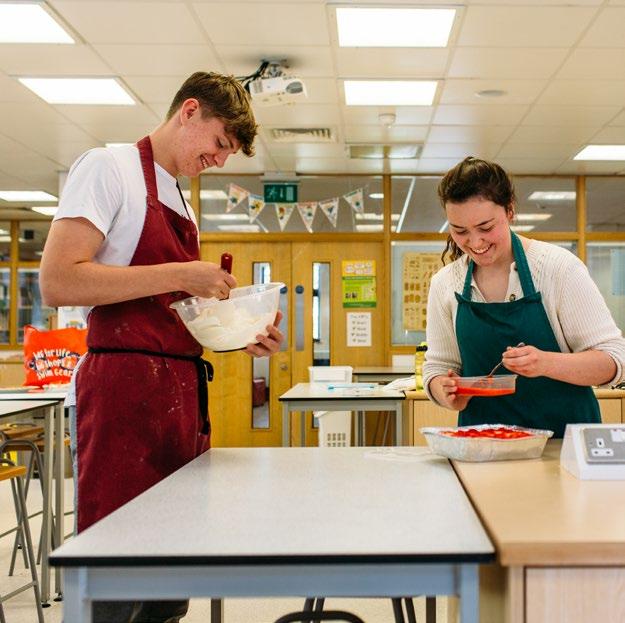
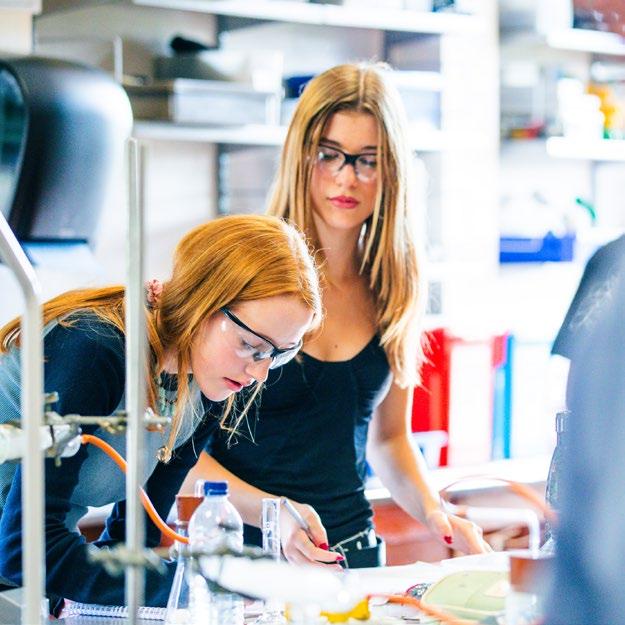
THE SIXTH FORM INDUCTION PROGRAMME
At the beginning of the Lower Sixth pupils take part in a two week induction programme which includes events, both academic and social, to enable them to make a positive start to Sixth Form.
The programme begins with a Lower Sixth Induction Conference on the day before the start of the school year in September, followed by a two-week induction into the students’ chosen A level subjects.
During this two week period students participate in bonding and social activities (including a short residential trip) to encourage the Lower Sixth to get to know one another. The two-week induction programme is particularly helpful for students who are new to the School.
PROGRESS AND TRACKING
The dedicated Sixth Form team at St Chris are there to support pupils every step of the way to ensure that their transition is a successful one.
Throughout their time in Sixth Form, pupils receive regular feedback and guidance about their progress from subject teachers. Each pupil is also involved in regularly reviewing their progress with their Personal Tutor.
Personal Tutors, Assistant Head (Sixth Form) and the Heads of Year 12 and Year 13 are all available to support students who may be experiencing problems, alongside school counsellors if appropriate. Any issues or concerns are sensitively and thoroughly discussed with students and parents. Student support is on-going and comprehensive.
Each year parents receive two interim reports and two full reports. There are also two Parents’ Consultations where subject teachers and Personal Tutors are available for one-to-one meetings. Pupils are encouraged to attend these meetings along with their parents or guardians.
All departments and subjects offer opportunities to support and extend pupil’s learning beyond the classroom. These are often at lunchtime or after school and in some cases, for example for A level Three Dimensional Design, they are at weekends.
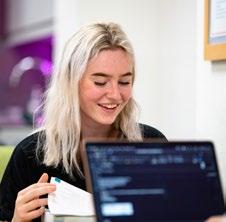
SIXTH FORM CENTRE
The Sixth Form Centre forms the central hub for academic and social life in the Sixth Form. There are quiet rooms and study areas for pupils to use during study periods. The facilities also include comfortable seating, a kitchen area, a coffee machine and table football and table tennis facilities.
The Broader Curriculum
As well as following their individual academic programme, members of the Sixth Form also take part in a number of other activities that are designed to broaden their experience. It is very much part of the St Chris tradition to encourage students to develop their personalities and interests as widely as possible. This process will be every bit as important as academic success when the time comes to find employment after university.
PSHE
There is a wide-ranging programme for PSHE in the Lower Sixth which follows the guidance from the PSHE Association and feedback from pupil voice about what they would like to cover. Visiting speakers come to the School to talk to the students about a variety of issues, for example: consent and relationships; the law; mental health; gap years; personal finance and careers. These compulsory sessions are a stimulating extension to the students’ programme and provide ample opportunity for developing thinking and discussion skills.
CAREERS AND HIGHER EDUCATION PROGRAMME
St Chris provides personalised guidance and support to help students formulate post Sixth Form plans through their Futures lessons which includes an ongoing programme of talks, visiting speakers and one-to-one sessions with their Tutors. Trips to universities and UCAS events provide many opportunities to speak to admissions teams in a wide range of colleges to help them make informed decisions about where to study next. In addition, all students have access to Unifrog, the leading careers and post-16 application platform which enables young people to consider what their next steps options are. Unifrog provides extensive information about a diverse range of careers, up-todate labour market information and detailed profiles of every course and university in the UK and some international ones too.
EXTENDED PROJECT QUALIFICATION
The School offers students the opportunity to submit an EPQ for examination. Students may pick any topics that interest them, so long as the question they are attempting to address meets the criteria of the course. The course lasts 12-18 months (depending on the start date).
Students are also allocated to an EPQ Supervisor for individual guidance during the process of producing the project itself.
POSITIONS OF RESPONSIBILITY
Sixth Form pupils play a vital role in school life at St Chris, and there are a number of positions of responsibility for which we encourage all pupils to volunteer; as Major Officials; as Peer Mentors; as participants in and leaders of the different committees and activities such as sports teams and as role models.
Sixth Form pupils are able to design, develop, implement and evaluate initiatives within St Chris and our wider community.
We strongly believe that our pupils, both collectively and individually, are an invaluable resource for the School and will also gain personally from their involvement.
MAJOR OFFICIALS
The whole school takes part in elections each year to vote for a committee of pupils to run the School Council. These posts are held by Lower Sixth pupils, and are termed Major Officials.
Major Officials also run a number of committees within the School including Events and Fundraising, Food and Be Green, our environmental committee. These committees are responsible for running activities such as the Summer Ball, the pupil tuck shop and developing initiatives such as reducing the School’s use of single use plastics.
POSITIONS INCLUDE:
Head Students
Deputy Head Students
Chair of Council
Treasurer of Council
Secretary of Council
Chair of Events & Fundraising
Chair of Be Green
Chair of EDI
Chair of Food Committee
Head Boarder
PEER MENTORS
Peer Mentors are Sixth Form students who act as mentors to younger students in the Senior and Junior Schools.
Peer Mentors offer a wide range of support – it can be anything from helping new pupils to settle in, or spending time with a younger student to help with a particular academic or social issue that they may have. The programme is a particularly popular way for students to commit to helping the whole school community and both Peer Mentors, and those that they work with, find that it’s a very rewarding role.
LEADERSHIP ROLES ACROSS ST CHRIS
There are various ways to lead and serve the pupil body in the Sixth Form in addition to being a Major Official or Peer Mentor. Pupils can take a leadership role in one of the many co-curricular groups, for example sports teams or music groups, or through their community service activities or through working with local and international charities.
COMMUNITY SERVICE
All members of Year 12 take part in the St Chris Community Service Programme from January in Lower Sixth. This involves a commitment of at least 10 hours where pupils undertake volunteer work at a variety of local charities and organisations. This has been found to be a rewarding experience and has led students to undertake further volunteer work in the Year 13 (Upper Sixth) or during a Gap Year.
St Chris has links with several local schools, care homes, community-based arts programmes and local charities. There are also opportunities within school, including helping with Junior School sports and after-school activities. Beyond this wide choice of pre-arranged placements, students can also make their own suggestions and plans if suitable.
SUBJECT-RELATED CONFERENCES AND EDUCATIONAL TRIPS
As part of the academic programme, departments frequently arrange trips to extend the academic experience. These include English, biology and psychology conferences, evening lectures from world-leading academics, poetry workshops, art gallery visits to London and Cambridge, visits to a Crown Court, theatre trips, biology and geography field trips and foreign language exchange visits for language students.
OTHER TRIPS AND VISITS IN THE SIXTH FORM
Sixth Form students have the opportunity to take part in a cycle of expeditions to places as diverse as Ladakh, Borneo and Madagascar.
During the week-long Late Summer Programme (LSP) at the end of the Summer Term, Lower Sixth students take part in a variety of activities, some aimed at Sixth Form, but many students accompany LSP trips in the lower years of the Senior School, to provide support for younger students and to gain experience in helping to plan and run a trip.
Recent LSP trips and activities have included:
• A level Art and History trip to Berlin or Paris
• A level Biology and Geography trip to Madagascar
• Year 9 trip to Switzerland
• STEM Headstart course

OPPORTUNITIES PROGRAMME
The whole Senior School is involved in Opportunities –our activities programme - on Thursday afternoons. Some of the current Opportunities include cycling, enamelling, film editing, costume and set design, Duke of Edinburgh’s Award and advanced cookery.
ADDITIONAL ACTIVITIES
SPORT
There is the opportunity to join in with a wide range of sports including badminton, football, netball, basketball, tennis and cricket. The School also has its own fully-equipped gym and a large indoor heated swimming pool. Since exercise is so important for a healthy lifestyle, we strongly encourage all students to participate.
DRAMA
The School has its own fully-equipped theatre and drama studio, and there are regular productions during the year. There is also the opportunity to join the technical support team in the Theatre.
MUSIC
There is the opportunity to learn a number of different musical instruments at St Chris. There is an orchestra and a range of other groups, including a jazz band and there are frequent opportunities to take part in music evenings and concerts.
OTHER ACTIVITIES
There are many additions to the School programme, which range from: Debate, Robotics, and sports such as table tennis and basketball to the Recycled Fashion Show, a popular annual event which encourages students to either design or model fashion items made from recycled materials.
Boarding in Sixth Form
Boarding at Sixth Form is a great option to consider for pupils who would like to focus fully on the academic step up to A levels by extending the school day, or perhaps for those pupils who may have a longer commute.
Current and recent Sixth Form pupils have commented on the benefits of staying in school to study in the evenings, and being part of a conscientious and focussed Sixth Form boarding community. Completing study work during the week at school also gives pupils the added benefit of freeing up time at the weekends to rest and recuperate once all their work has been completed.
Our Sixth Form boarding community is thriving and friendly. We offer full boarding, weekly boarding and flexi boarding, where pupils stay up to two nights a week.
Sixth Form boarders have their own bedrooms with shared communal spaces. Our boarders come from near and far and they experience an inclusive and welcoming community where life-long friendships are made.
Boarding is led by Houseparents, who are supported by Resident Tutors. Our Houseparents share many years of experience caring for young people in co-educational boarding settings.
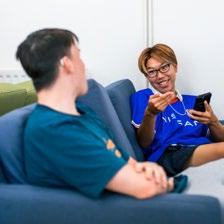
Our boarding staff share a belief in a purposeful and wellordered living and learning environment, a friendly and informal home where everyone feels comfortable and cared for. Boarding enables young people to learn the relationship between rights and responsibilities, and the balance between individuality and being part of a community. Our aim is that our boarders will develop a capacity for tolerance, self-sufficiency and independence that will serve them well throughout their adult life.
In addition to studying, there are many optional activities on offer for boarders in the evenings and at weekends both on and off campus. During the week this could be go-karting, a trip to a trampoline park or a cookery evening. Boarders can also enjoy using several communal areas, including television rooms, a games room, study areas and kitchens. They also have access to many of the main school facilities outside of the normal school day, for example the swimming pool, tennis courts and skate park.
For pupils currently at St Chris, trial boarding nights can be arranged to give you a taster of what boarding is like.
Please contact the Admissions department for further information.
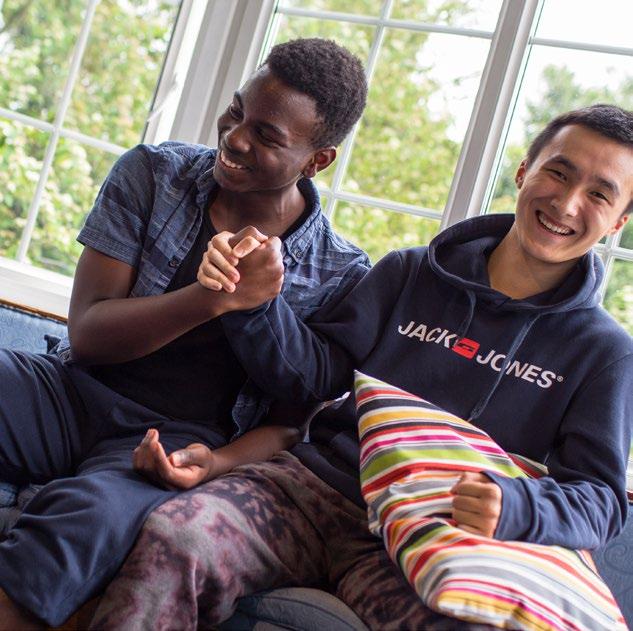

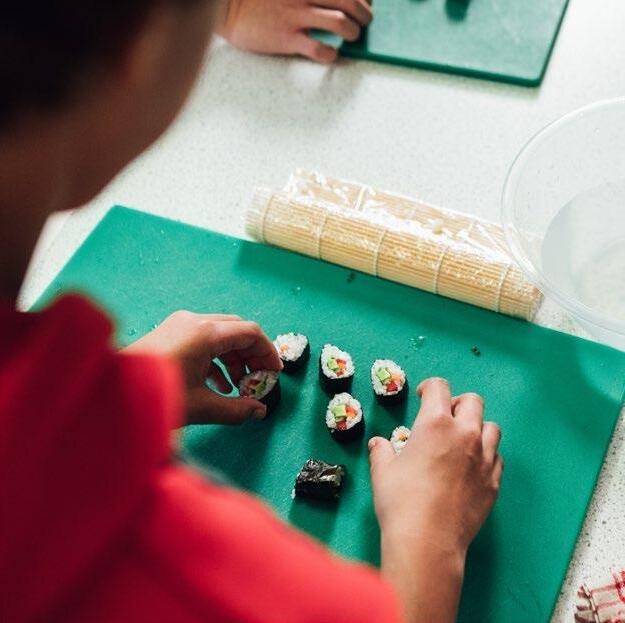
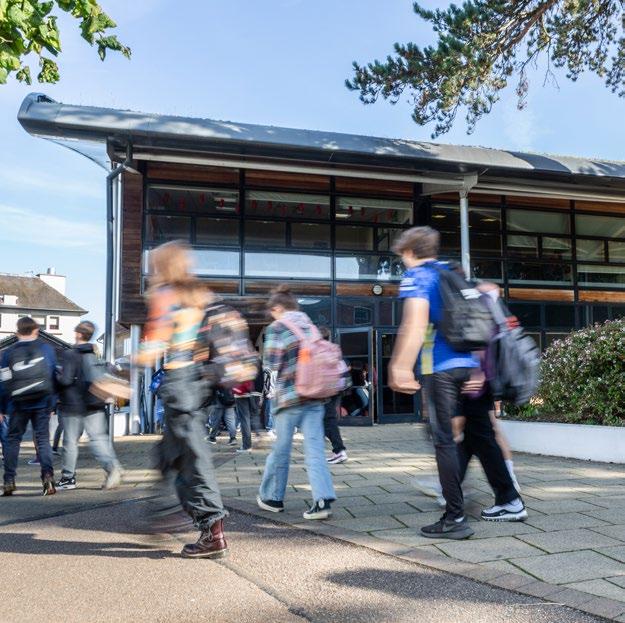
Scholarships & Fee Assistance
St Chris offers a range of scholarships and fee assistance (bursaries) to encourage applications to the Sixth Form.
SCHOLARSHIPS
Each year there is one Academic Scholarship and one Art Scholarship awarded in Lower Sixth.
Scholarships form a maximum value of 10% of tuition fees, and are awarded after consideration of an applicant’s performance in assessment exercises and interviews. They are awarded on merit and/or the ability to make an outstanding contribution to the wider life of the School.
Academic Scholarships are awarded following consideration of an applicant’s performance in their GCSE examinations, and all candidates are automatically considered.
Art Scholarships need to be applied for separately and include an interview with the Art Department and the Head. Applicants will be asked to bring a portfolio of their work to discuss alongside a more general talk about their interests and experiences in the creative arts.
HOW TO APPLY FOR AN ART SCHOLARSHIP
To be considered for an Art Scholarship, please indicate your interest when registering via our online Registration Form. You will then be asked to complete an additional form on our online admissions portal. The deadline for submitting Art Scholarship applications for September 2026 entry is Friday 28 November 2025
Students who are currently in Year 11 at St Chris and who are moving to the Sixth Form need to register their interest via the Admissions Department by Friday 28 November 2025.
FINANCIAL ASSISTANCE
We are committed to ensuring that pupils who would benefit from an education at St Chris are not excluded from entering the School owing to their financial circumstances by offering means tested financial support with school fees to pupils who meet the School’s admissions criteria.
This support is known as a Bursary. Bursaries are awarded in the form of a fee discount ranging from 5% – 100% in cases of proven need, depending on the individual circumstances of the individual.
St Chris is also committed to ensuring that no current pupil should have to be withdrawn part-way through a stage of their education owing to unforeseen financial difficulties, by offering means tested hardship support.
Each year The Robertson Bursary Trust and St Chris fund two full places for pupils to attend our Sixth Form. Financial assistance can cover both day and boarding fees. The fund was set up by the Robertson family, who have been part of the St Chris community as pupils, active Old Scholars and Governors for many years.
HOW TO APPLY FOR FINANCIAL ASSISTANCE
In the first instance, please register your child via the school’s online admissions portal and indicate that you would like to apply for a Bursary on the Registration Form.
You will then be sent a link to the secure online Bursary Application Form. This must be completed by Friday 28 November for those pupils looking to join the school in September.
Means-testing is conducted in partnership with a third party Bursary Assessment Associates.
Parents are required to fill in an online form, provide evidence of their financial circumstances and a representative from Bursary Assessment Associates will either visit you at home or meet with you online. The application process is covered in detail in our Bursary Policy.
Bursaries are reviewed annually and the award may be varied upwards or downwards, depending on financial circumstances.
Parents who would like to apply for hardship support should contact the Head’s Office by emailing toni.warner@stchris.co.uk for further information.


Extended
Project Qualification (epq)
St Chris offers students the opportunity to pursue the Extended Project Qualification (EPQ). Increasingly the EPQ is the ideal way to maintain breadth in what a student studies in the Sixth Form and also develop research and independent study skills. It is excellent preparation for the types of skills needed at degree level and can give extra ‘weight’ and value to a university application.
WHAT IS THE EPQ?
The EPQ is a qualification awarded for either the writing of a single extended essay or the production of an artefact (e.g. a drama performance or piece of art).
It receives a grade (A*-E) like any other subject. It is the equivalent of an AS level in terms of UCAS points (28 points for A*, 24 for A, etc. under the UCAS tariff system), but the true value lies more in the process of its production and what it says about the student and the skills, intellectual capacity and perseverance they must show to complete it.
To complete the EPQ, a student is required to
• Produce a Project (a 5000 word essay, or a production/ artefact with a 1000 word report)
• Keep a production log (a diary of whatever they do throughout the Project)
• Give a short presentation and take questions from an audience on their Project.
WHY CONSIDER AN EPQ?
The EPQ enables students to develop the skills of independent and extended study. This is enjoyable and rewarding in its own right but is also excellent preparation for university. The EPQ can also be a lot of fun, as there is no limit to what you can investigate; its open nature brings extra breadth to a student’s study programme and allows them to follow a subject or topic about which they are passionate and interested. The qualification is also highly-regarded by universities who are increasingly looking for students who bring something extra to the table, beyond the basic A level grades that tens of thousands of applicants possess.
WHAT DO UNIVERSITIES THINK OF THE EPQ?
Universities have a high opinion of the EPQ, particularly those which are more selective, because it develops qualities in students that they deem key to success in the Higher Education environment.
For example, the Director of Admissions at Cambridge writes: “the potential benefits of extended projects are enormous… Cambridge is one of many universities which support Extended Projects as good preparation for degree-level study.”
Here’s a sample of some universities’ policies on EPQ:
• Some tutors make two offers: AAA at A level, or AAB and an EPQ (e.g. Bristol and Southampton)
• EPQ is not included in the UCAS offer, but will be considered if the conditions are not met (London School of Economics)
HOW DOES ST CHRIS SUPPORT THE EPQ?
To an extent, working habits have to be self-directed and independent - that is the whole point of the EPQ! Nevertheless, students receive clear and consistent support for their project:
• Each EPQ student will be allocated a Supervisor who will have broad expertise that best matches their chosen area of study
• Advice on how to execute the EPQ from the Supervisor and EPQ Coordinator
• Sessions devoted to research skills and specific support from the library
• Allocated time in their timetable
TIMESCALE
The EPQ is an independent research project. This means it is completed in the pupil’s own time. You will begin the planning stages in the Autumn of Lower Sixth and begin working on the project in earnest in the Spring term.
The main deadline is November of the Year 13 (Upper Sixth) . However, the exam board advise that you spend 90 hours of your own time on the EPQ - so you can’t leave it until the last minute! Your Supervisor arranges to see you during the Spring, Summer and Autumn terms to discuss your progress.
Art & Design
WHY STUDY ART & DESIGN?
At St Chris we offer students the opportunity to take a wide range of Art and Design A levels. The courses are delivered by the Art Department or the 3D Design Department depending on which Art and Design A level you follow.
The Art and Design A levels St Chris offers are:
• Art and Design: Art, Craft and Design
• Art and Design: Fine Art
• Art and Design: Graphic Communication
• Art and Design: Photography
• Art and Design: Textile Design
• Art and Design: Three-Dimensional Design
Students can study more than one Art A level and can build a whole A level programme out of the arts. Please see subsequent pages for more information about the options in detail.
The Art and Design Faculty operates more like an art college with art college-level facilities: a ceramics room with wheels and kilns; a well-equipped 3D design workshop with machines
- laser cutter, jewellery making etc.; a dedicated textiles room with sewing machines, overlocker, heat transfer press, spinning wheel etc.; printing presses and specialist digital arts room with software including Adobe Creative Cloud (can be downloaded on student’s own devices at home), Blender, Fire Alpaca, 2D Design and photo printer; two wellequipped darkrooms.
Key in all this is the individual studio space - typically a corrale in a general studio in Lower Sixth and a space in the shared Year 13 (Upper Sixth) studio in the second year.
Echoing the creative industry at the moment, the department allows the movement between these specialist work areas and the cross-over of techniques and processes as they arise.
The individual spaces allow a 1:1 tutorial-based approach and students can come and work in free periods as and when. This fosters independence, the developing and honing of a wide range of technical skills, as well as supporting and building confidence in making creative decisions/higher order thinking.
The courses are taught by the Art Department who are specialists across a breadth of disciplines, and this is amplified by visiting artist and practitioner workshops for example in film making or graphic design.
We also teach life drawing - students studying any of our art courses can attend.
Throughout the two year course, students participate in gallery trips including Late Summer Programme (LSP) to a European capital city.
We also support with the next steps beyond A level, especially with application portfolios, connections for work experience and applications to top art colleges.
WHICH ART & DESIGN A LEVEL(S) SHOULD I CHOOSE?
The best thing is usually to talk through options with the Art and Design Faculty in order to put together the best programme for the individual.
All the courses have been designed to provide engaging and innovative creative learning experiences, where art, craft and design practice is meaningfully integrated with theoretical knowledge and understanding.
An Art and Design A level provides students with opportunities to develop a broad foundation of critical, practical and theoretical skills that offers them a holistic understanding of a range of practices and contexts in the visual arts, crafts and design fields, culminating in greater specialism and achievement.
Whichever A level or combination of A levels is followed, the course encourages creativity, sustained investigation and analysis, experimentation, and design and making as a means of developing technical and expressive skills.
It gives students the opportunity to follow a programme of study which extends experience and personal response as well as developing imagination and critical and reflective thinking. The ability to innovate, adapt and work independently, which underlies all aspects of the specification, is valued by higher education and employers alike.
A LEVEL ART AND DESIGN (WJEC EDUQAS)
Title
Component 1 Coursework: Personal Investigation
Two integrated constituent parts:
Part 1: An in-depth critical, practical and theoretical investigative project/ portfolio and outcome/s based on themes and subject matter that have personal significance; Part 2: an extended written element (1000 words minimum) that clearly relates to practical and theoretical work using an appropriate working vocabulary and specialist terminology.
60% of A level
120 marks
Assessed by the teacher
Externally moderated
Component 2 Externally Set Assignment
A range of questions is set by WJEC Eduqas on 1 February in Year 13 and ‘Preparatory time’ then follows. This culminates in a 15 hour supervised period of sustained focus work.
WHAT DOES THE COURSE INVOLVE?
We follow the WJEC Eduqas Specifications which are assessed through a combination of examinations and coursework.
40% of A level
80 marks Set and moderated externally
Assessed by the teacher
“Amazing facilities, loved the art department and seeing the quality of work on show.”
Starters’ Survey
Art & Design
Art, Craft & Design
This is a broad-based course that provides flexibility in content and approach. The course is delivered by the Art Department.
Students can choose this option if they want to explore and create work associated with more than one Art and Design A level.
ART
Art combines practical and intellectual activity and tends to focus on creative expression. Processes and outcomes are influenced by certain constraints or intentions, many of which are personally determined by the artist. Processes can be structured or open-ended and might involve exploration of experiences, feelings, perceptions and observations that may include direct, critical and analytical study of artefacts, objects, places and people. They may be initiated by the individual or in response to given stimuli, such as a theme, issue, or problem. Outcomes can reflect the individual’s imagination, influences and intentions in following an idea, conveying an experience or expressing feelings, often with the purpose of engaging others who will see the work.
CRAFT
Craft combines practical and intellectual skills and focuses on creatively using them to sensitively manipulate materials, tools and processes. It involves applying knowledge and understanding of materials and their working characteristics, together with craft skills and creative intentions that take account of the needs of both the maker and the user of the final outcome. Although learners need to have a working knowledge and appreciation of traditional materials, tools and processes, they should also be familiar with the use of new and emerging materials and technologies in contemporary craftwork. It is essential that appropriate emphasis is placed on creative ideas and imaginative approaches, in the use of materials and craft skills.
DESIGN
Design places emphasis on the way practical and intellectual activity combine in order to respond to people’s needs.
Usually, these are not identified by the designer alone and this distinguishes design from most art and craft procedures that have largely been initiated by the individual artist or craftsperson. The designer tends to work within externally set parameters and takes account of such matters as the use that is to be made of the outcome, durability, ergonomics, aesthetic appearance, costs, availability of materials and methods of production. Processes and outcomes can range from being quirky, imaginative and risky to thoughtful adaptation and improvement of existing designs.
Art, Craft and Design is distinguishable from other Art and Design A Level options in as much as learners are enabled to demonstrate personal interests and abilities across a broad course of study.
They should explore selected practical and contextual areas of art, craft and design through a range of two and/or three dimensional media and processes.
Art, craft and design can involve use of an almost limitless range of materials, techniques and processes.
WHAT WILL YOU NEED TO BE GOOD AT?
The student will require proven ability in both creative and technical skills.
HOW WILL YOU BE TAUGHT?
Throughout the course the student is given individual directions and guidance, although we place much value on independence, personal responsibility and creativity. The facilities available and approaches taken have much in common with art college methodology. Students develop and demonstrate skills and techniques in the context of their chosen area of study.
WHAT CAN YOU DO WITH THE QUALIFICATION?
The department has a long record of entry into the country’s top art colleges. A level Art and Design is accepted by universities for most courses and need not necessarily lead to specialisation in the subject.

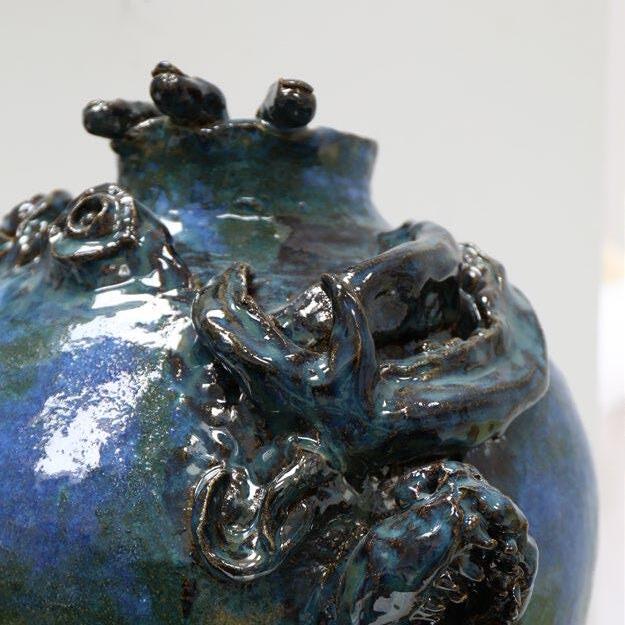


Art & Design Fine Art
WHY STUDY FINE ART?
Fine Art is distinguishable by the emphasis it places on aesthetic and intellectual purposes rather than on practical, functional and utilitarian considerations.
This A level covers a broad and developing area of study that includes:
• Painting and drawing
• Mixed media, including collage and assemblage
• Performance and conceptual art
• Sculpture
• Land or environmental art
• Installation
• Printmaking: relief, intaglio, screen processes and lithography
• Film, animation, video, photography
It utilises traditional, new and emerging media and processes and involves expressive use of a particularly wide range of materials, techniques and skills.
The course is delivered by the Art Department.
WHAT WILL YOU NEED TO BE GOOD AT?
The student will require proven ability in both creative and technical skills.
HOW WILL YOU BE TAUGHT?
Throughout the course the student is given individual directions and guidance, although we place much value on independence, personal responsibility and creativity. The facilities available and approaches taken have much in common with art college methodology. Students develop and demonstrate skills and techniques in the context of their chosen area of study.
WHAT CAN YOU DO WITH THE QUALIFICATION?
The department has a long record of entry into the country’s top art colleges. A level Art and Design is accepted by universities for most courses and need not necessarily lead to specialisation in the subject.

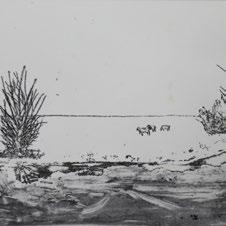
Graphic Communication

WHY STUDY GRAPHIC COMMUNICATION?
Graphic Communication is defined as the process by which ideas are communicated through the use of symbols, drawings, photographs and typography to convey concepts and/or emotions.
An A level in Graphic Communication encompasses a wide and developing area of study, incorporating a variety of related disciplines and utilising traditional skills, such as calligraphy and hand-formed lettering, alongside cuttingedge digital technologies.
Boundaries between related graphic processes are becoming increasingly blurred but aspects, such as advertising, packaging design, computer games, web and multimedia design, illustration and typography, provide an indication of what might be covered within the option.
Graphic Communication may also be closely associated with animation, architecture, photography and design for print.
Outcomes can be two and three dimensional, and can take the form of posters, brochures, flyers, T-shirts, CD/DVD sleeves, book covers, magazine spreads, calendars, stamps, packaging, publicity materials, vehicle livery, billboards, advertising, logos, branding, corporate identity, and three dimensional point-of-sale and exhibition design.
The course is delivered by the Art Department.
WHAT WILL YOU NEED TO BE GOOD AT?
The student will require proven ability in both creative and technical skills.
HOW WILL YOU BE TAUGHT?
Throughout the course the student is given individual directions and guidance, although we place much value on independence, personal responsibility and creativity. The facilities available and approaches taken have much in common with art college methodology. Students develop and demonstrate skills and techniques in the context of their chosen area of study.
WHAT CAN YOU DO WITH THE QUALIFICATION?
The department has a long record of entry into the country’s top art colleges. A level Art and Design is accepted by universities for most courses and need not necessarily lead to specialisation in the subject.
Art & Design Photography
WHY STUDY FINE PHOTOGRAPHY?
A level Photography covers a broad and changing area of study with light-based imagery spanning almost two centuries.
As part of the course you might engage with early lightbased images and rudimentary technology, such as a pinhole camera, as well as the most contemporary, which may include the use of digital cameras, video camcorders, photocopiers, scanners and mobile phones.
The course is delivered by the Art Department.
Photography is taught in a separate block with skills taught in darkroom processes as well as the digital manipulation of still images and video. Students are taught both digital and analogue techniques in the first year and may specialise if they wish later on.
Students will have access to the Theatre and Drama Studio and lighting for photo/video-shoots.
Outcomes can be screen or print based, comprise still or moving images and might be discrete to the subject area or combined with other art forms.
Possible areas of study include:
• Photographing people
• Photographing places
• Still-life photography
• Documentary photography
• Photojournalism
• Experimental imagery
• Photographic installation
• Fashion photography
• Digital imaging
• Moving image (video, film, animation).
Photography is a useful subject at the moment with an increasing number of degree courses with lens-based and digital elements due to the fast-expanding media industry.

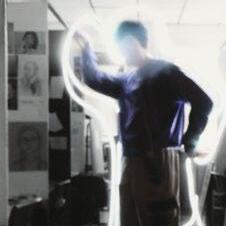


WHAT WILL YOU NEED TO BE GOOD AT?
The student will require proven ability in both creative and technical skills.
HOW WILL YOU BE TAUGHT?
Throughout the course the student is given individual directions and guidance, although we place much value on independence, personal responsibility and creativity. The facilities available and approaches taken have much in common with art college methodology. Students develop and demonstrate skills and techniques in the context of their chosen area of study.
WHAT CAN YOU DO WITH THE QUALIFICATION?
The department has a long record of entry into the country’s top art colleges. A level Art and Design is accepted by universities for most courses and need not necessarily lead to specialisation in the subject.


Textile Design
WHY STUDY TEXTILE DESIGN?
A Level Textile Design encompasses a very broad range of materials, techniques and processes, including a growing number of interdisciplinary approaches.
These comprise woven, embroidered, knitted, printed, painted, dyed, manipulated, embellished and constructional methods which are utilised to produce a great variety of textile outcomes that include costume and fashion design, accessories and body adornment. The range is increasing as new materials and technologies emerge.
Possible areas of study include:
• Fashion
• Costume
• Digitally or traditionally printed and/or dyed fabrics, garments and materials
• Interior design
• Constructed textiles (knitted, woven, embellished or combined with other materials)
• Textile installation
• Accessories
The course is delivered by the Art Department.
There is also the opportunity to be involved in the St Chris Recycled Fashion Show either as a designer or as part of the organisational team, gaining valuable experience in running or taking part in events.
WHAT WILL YOU NEED TO BE GOOD AT?
The student will require proven ability in both creative and technical skills.
HOW WILL YOU BE TAUGHT?
Throughout the course the student is given individual directions and guidance, although we place much value on independence, personal responsibility and creativity. The facilities available and approaches taken have much in common with art college methodology. Students develop and demonstrate skills and techniques in the context of their chosen area of study.
WHAT CAN YOU DO WITH THE QUALIFICATION?
The department has a long record of entry into the country’s top art colleges. A level Art and Design is accepted by universities for most courses and need not necessarily lead to specialisation in the subject.
Art & Design Three-Dimensional Design
WHY STUDY THREE-DIMENSIONAL DESIGN?
This specialist 3D design course will enable you to create, develop and make your creative ideas as high quality threedimensional work. This can include: furniture, sculpture, lighting, jewellery, domestic products and proposals in model form (for example Interior Design and Theatre/Set design).
We specialise in advanced 3D work using specialist tools and techniques for shaping and forming wood, metal, and plastics.
The course is demanding but great fun, and is very hands-on. Communication and project management are key skills, and you will use your sketchbook for both. There is a practical workshop exam, but no written paper to sit.
Our students widely explore art and design from the 20th Century, including present day artists and designers, and develop amazing ideas: learning new practical skills in our amazing workshops and design studio.
WHAT WILL YOU NEED TO BE GOOD AT?
• Thinking creatively and analytically. You will need to respond imaginatively to different topics, which will encourage you to explore your own ideas as well as to look at the influence of other artists and designers.
• Exploring ideas in 3D. You should enjoy being able to work with your hands, experimenting with different materials to develop and express your ideas via the workshop.
• Communicating what you are doing using a sketchbook. This will involve research, photography, annotation, freehand sketching and more formal drawing techniques including CAD (we use 2D Design, Spaceclaim, and Photoshop software).
• Project management and working independently. Our most successful candidates have a strong work ethic and put in extra hours during study periods and at our weekly afterschool “Shed” sessions.
• You should ideally have studied GCSE Art and/or 3D Design. This will have enabled you to have followed the process of creating a sketchbook or folder of: research, analysis and the development of creative ideas through the models, test constructions and final components.
• Structuring an essay. In the Year 13 (Upper Sixth) you will produce an illustrated 1000-word essay based account of your Personal Investigation Project.
HOW WILL YOU BE TAUGHT?
The course is delivered by the 3D design department and taught by specialist 3D art and design teachers, and you will be based in our unique workshop / studio space: with access to a wide range of materials, tools, machines, IT and hand processes. If you are keen on pursuing a creative design career, we would suggest that you consider taking two or even three Art and Design A levels: one in 3D Design and the other within the wider Art Department.
YOU WILL
• Communicate your ideas in a sketchbook of creative drawing, undertake primary and secondary research, freehand sketching, detailed annotation, model making, Computer Aided Design, and the making of prototypes and a substantial final piece.
• Study influential product designers/design movements/ iconic products. This will include trips out of school and shop/gallery visits.
• Learn to use a wide range of advanced workshop tools, machines, materials and processes: including MIG welding, brazing, laser cutting, laminating wood, and various surface treatments.
• Create one minor project and one major project, along with assorted other creative design and making work.
• Produce an illustrated essay about your major project.
• Prepare for a 15-hour practical exam at the end of Year 13 (Upper Sixth) , based on a topic set by the exam board.
• Take part in a public exhibition of your work at the end of the course.
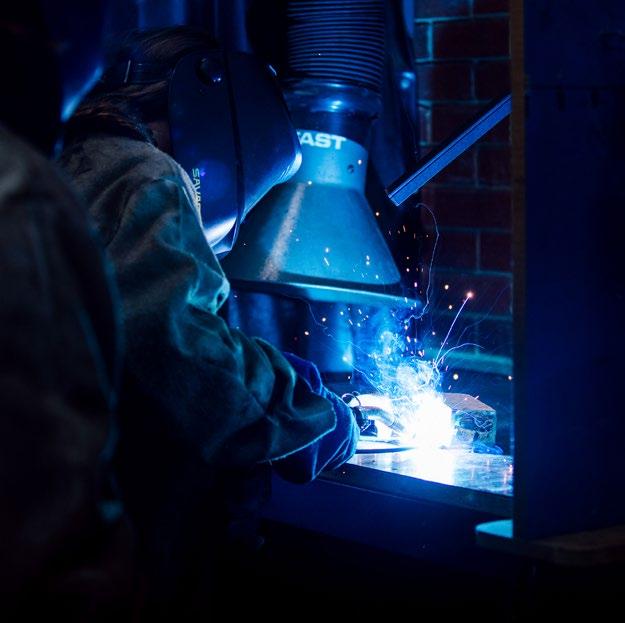
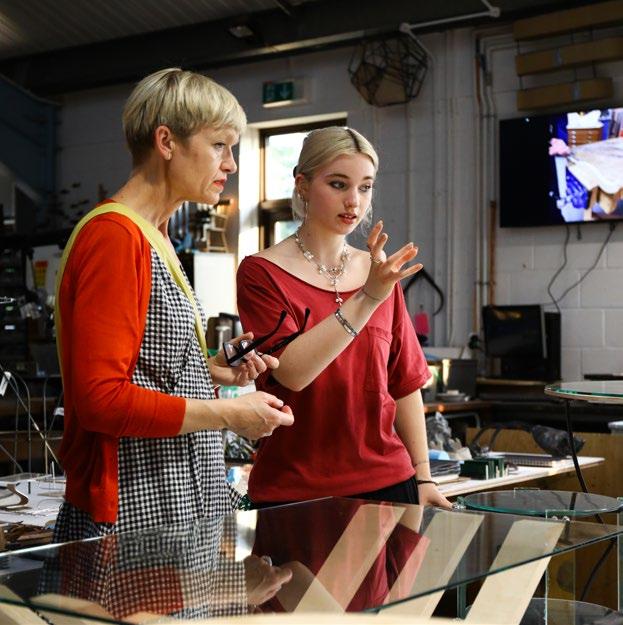
WHAT CAN YOU DO WITH THE QUALIFICATION?
Our 3D Design course develops creative, analytical thinkers and makers with strong project management skills. As well as producing highly impressive 3D work in its own right, this leads you to present as an excellent candidate for progression to university studies. A level Art and Design: Three-Dimensional Design is ideal for developing portfolio applications to a wide range of exciting higher-level courses including: art foundation, architecture, product design, furniture design, sculpture, jewellery making and landscape architecture. (Please note that engineering degrees require maths and sciences rather than A level Art / 3D Design)
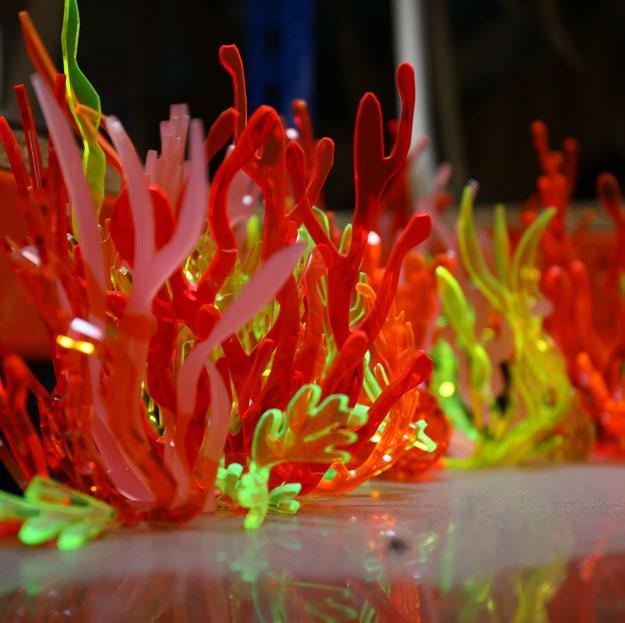
Biology
WHY STUDY BIOLOGY?
Biology covers a wide range of topics that help us to understand the world around us, from explaining the structure and function of organs within our body to discussing the benefits of maintaining biodiversity. New discoveries and advances are continually being made in the field of biology and you will learn about the principles behind techniques such as stem cell therapies and DNA technologies.
Biology is often chosen by students in combination with the other sciences, particularly chemistry. Geography and psychology also complement biology well. In addition, biology appeals to many students who are studying arts or humanities and who would like to study a science for variety and wider interest.
WHAT WILL YOU NEED TO BE GOOD AT?
It is essential that you have a genuine interest in the subject and are fully committed as biology is a challenging subject; a Grade 5 or above in GCSE Biology or GCSE Additional Science and Core Science is vital. In addition, as part of the course you will study biochemistry topics so a good understanding of chemistry is also required and studying A level Chemistry would support your studies in biology. You will need to be able to communicate effectively, both in writing and orally, be able to research information from a variety of sources, have a good memory for scientific names and factual information and be confident in handling and interpreting data in graphs, tables and in other forms.
HOW WILL YOU BE TAUGHT?
Lessons will involve a mixture of class teaching, discussion, video clips, practical work and written tasks. Learning is an active process and everybody is expected to participate fully in lessons. There will also be independent research and presentation tasks, as well as the opportunity to carry out field work and go on trips. Regular tests will monitor your progress throughout the course.
WHAT CAN YOU DO WITH THE QUALIFICATION?
Biology is classed as one of the ‘facilitating subjects’ by the Russell Group universities so is very useful in gaining access to a wide range of degree courses.
If you are considering biological or biomedical sciences at university, most universities will expect you to have also studied A level Chemistry.
Past students of A level Biology have gone on to successfully follow a degree in courses such as: medicine, natural sciences, biochemistry, forensic biology, anthropology, archaeology, ecology, psychology and sports science.
“Excellent curriculum opportunities. Very interesting topics studied thoroughly, including a wide range of projects. Very high academic standards and each child is valued and stretched.”
Parents’ Survey
A LEVEL BIOLOGY (OCR SPECIFICATION H420)
Module Title Assessment
Module 1 –Development of Practical Skills in Biology
Module 2 –Foundations in Biology
Module 3 –Exchange and Transport
Module 4 –Biodiversity, Evolution and Diseases
Module 5 –Communication, Homoeostasis and Energy
Module 6 –Genetics, Evolution and Ecosystems
Component 01: Biological Processes - testing Modules 1, 2, 3 and 5
2 hour 15 minute written paper: 100 marks Section A contains 15 multiple choice questions; Section B contains short answer and extended questions
Component 02: Biological Diversity - testing Modules 1, 2, 4 and 6
2 hour 15 minutes written paper: 100 marks
Multiple choice, short answer and extended response questions
Component 03: Unified Biology - testing ALL modules 1 hour 30 minutes written paper: 70 marks
Short answer and extended response questions
Business AQA Exam Board
BUSINESS
A level Business gives you an introduction to the world of business, helps you understand how businesses operate and provides a good foundation for further study. With a focus on the practical skills of running a business, the course is designed to help you become a good decision maker, manager, analyst and problem solver. These skills are highly sought after and valued in a wide range of organisations and careers.
WHAT DOES THE COURSE INVOLVE?
A level Business introduces students to a range of key business areas and concepts: marketing, operations, finance, human resource management, decision making, leadership and production management. In the second year the focus is on the strategic decisions that all businesses must make to survive and thrive in a competitive market place.
Students will study business in a variety of contexts (e.g. large/small, UK focused/global, service/manufacturing) and consider the following topics:
• What is business?
• Managers, leadership and decision making
• Decision making to improve marketing performance
• Decision making to improve operational performance
• Decision making to improve financial performance
• Decision making to improve human resource performance
• Analysing the strategic position of a business
• Choosing strategic direction
• Strategic methods: how to pursue strategies
• Managing strategic change

WHAT CAN YOU DO WITH THE QUALIFICATION?
A level Business is a valuable introduction to students who want to study business, finance or management at university. It also provides useful transferable skills applicable across a very wide range of careers – marketing and advertising, personnel and human resources, coaching, journalism, working in the voluntary sector, consultancy and accountancy.
A LEVEL BUSINESS (AQA SPECIFICATION 7132)
15 multiple choice questions worth 15 marks; short answer questions worth 35 marks;
Two essay questions worth 25 marks each.
marks
Three data response compulsory questions worth approximately 33 marks each and made up of three or four part questions.
One compulsory case study followed by approximately six questions.
Chemistry
WHY STUDY CHEMISTRY?
The non-living world and living organisms rely on intricate and subtle chemistry. Studying this is a somewhat complex task and A level Chemistry is a key step along that road to understanding nature.
It is intellectually challenging: you will learn a little Quantum Theory in order to understand how electrons behave in atoms; use the Laws of Thermodynamics to understand why changes happen in the way they do; and why energy sometimes seems to go “uphill”.
Many students study A Level Chemistry alongside Biology, Physics or both. Chemistry is sometimes described as ‘the central science’ as it helps to bridge the traditional ‘physical sciences’ with applied sciences. In doing so, it helps to explain many everyday phenomena and is an interesting subject to study.
WHAT WILL YOU NEED TO BE GOOD AT?
You should be getting grades 5 - 9 in two or more sciences at GCSE. A level Chemistry is more mathematical in places than at GCSE, so ideally you would also have grade 5 - 9 in GCSE Maths. If you intend to study chemistry or biochemistry at university level you should also take A level Mathematics. However, this is not essential in order to understand the maths in the A level Chemistry course.
HOW WILL YOU BE TAUGHT?
Over the course of the two-year programme, you will complete the ‘practical endorsement for A Level Chemistry.’ This comprises of a series of practical activities, from twelve key groups, whereby you are assessed on your ability to follow instructions, handle reagents safely, use a wide range of apparatus to collect accurate data and present data in a scientific way.
The aim of this endorsement is to develop your practical skills so that you finish the course as a competent practical chemist. This is awarded alongside your examination grade on results day and most universities require the endorsement to be passed. These skills will also be examined through the written examinations.
WHAT CAN YOU DO WITH THE QUALIFICATION?
The possibilities are endless! Studying A Level Chemistry opens up a whole host of degree subjects at university, including chemistry, biochemistry, medicine, engineering, as well as those unrelated to the sciences.
A Level Chemistry teaches many transferable skills which are useful for several degrees and careers and the course is well regarded by many universities. This is because it develops your analytical and problem-solving skills and requires you to work methodically and think logically. In fact, after studying A Level Chemistry you could find yourself in careers including drug discovery and pharmaceutical science, food technology, chemical engineering, environmental sciences, pharmacology, research and development, project management, accounting and finance and many, many more!
WHAT DOES THE COURSE INVOLVE?
You will follow the OCR H432 specification. Modules 1-4 are covered in Year 12 and modules 5-6 in Year 13.
The practical endorsement runs throughout the two years.
At the end of Year 13 these modules are assessed over three papers - one examines all aspects of physical chemistry, one examines organic chemistry and the final paper, Unified Concepts, covers all parts of the specification.
The written examinations include multiple choice questions as well as short answers and extended responses.
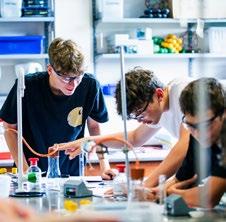
A LEVEL CHEMISTRY (OCR SPECIFICATION H432)
Module Title Assessment
Module 1 –
Development of practical skills in chemistry
Module 2 –
Foundations of chemistry
Module 3 –
Periodic table and energy
Module 4 –
Core organic chemistry
Module 5 –
Physical chemistry and transition elements
Module 6 –
Organic chemistry and analysis
Component 01: Periodic table, elements and physical chemistry - testing Modules 1, 2, 3 and 5
2 hours 15 minutes written paper: 100 marks
Component 02: Synthesis and analytical techniques - testing Modules 1, 2, 4 and 6.
2 hours 15 minutes written paper: 100 marks
Component 03: Unified chemistry – testing all Modules (1 to 6)
1 hour 30 minutes written paper: 70 marks
Component 04 (non-exam assessment)
The Practical Endorsement can form part of the A level. A level students can be entered for Component 04
– ‘Practical Endorsement in Chemistry’ and the grade in their final award is endorsed accordingly. This is teacher assessed and evidenced.
This will be a separately reported result
Computer Science
WHY STUDY COMPUTER SCIENCE?
Computer Science A Level develops your understanding of how computers work at a deeper level and equips you with advanced programming skills. It combines mathematical reasoning, creativity, and technical expertise to prepare you for a rapidly changing digital world. The subject is a gateway to some of the most exciting and in-demand careers.
WHAT SKILLS WILL YOU NEED FOR A LEVEL COMPUTER SCIENCE?
• Strong logical reasoning and analytical skills.
• A solid foundation in Mathematics - particularly algebra and problem-solving.
• Independent thinking and self-motivation to tackle extended coding tasks.
• Creativity in designing solutions and applications.
• Patience and resilience when debugging and improving code.
WHAT YOU WILL BE TAUGHT
The course combines theoretical knowledge with practical programming. You will explore:
• Fundamentals of programming, algorithms, and data structures.
• Computational thinking and problem-solving.
• How computers work - from hardware architecture to operating systems.
• Communication and networking.
• Databases, Big Data, and emerging areas such as artificial intelligence.
• The impact of computing on society, including legal and ethical considerations.
• An independent programming project, where you design and build a substantial piece of software.
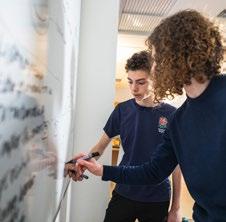
WHAT YOU CAN DO WITH THE QUALIFICATION
Computer Science A Level is excellent preparation for degrees in Computer Science, Software Engineering, Artificial Intelligence, Data Science, Mathematics, and related fields. It opens doors to careers in software development, robotics, cybersecurity, fintech, research, and beyond. The skills you gain - logical thinking, precision, and problem-solving - are valued in every industry.
“An exciting school to attend”
Starters’ Survey
A LEVEL COMPUTER SCIENCE (OCR SPECIFICATION H446)
Component 1 Computer systems
The characteristics of contemporary processors, input, output and storage devices; Software and software development; Exchanging data; Data types, data structures and algorithms; Legal, moral, cultural and ethical issues. 40% of A
Component 2 Algorithms and programming Elements of computational thinking; Problem solving and programming; Algorithms to solve problems and standard algorithms.
Component 3 Programming project
The learner will choose a computing problem to work through according to the guidance in the specification. Analysis of the problem; Design of the solution; Developing the solution; Evaluation.
Core Maths
WHY STUDY CORE MATHS?
If you would like to continue studying maths, but don’t want to take A Level Maths, you can choose to do Core Maths alongside your A levels. Core Maths is an exciting course and is all about solving real-life problems. It explores the real world applications of maths, including financial calculations such as income tax, inflation, mortgages and loans; as well as developing the increasingly important skill of critical analysis of data. It fits in well with subjects such as Biology, Geography, Psychology, Business Studies and Economics. It’s a great way to keep your maths skills fresh whilst developing skills that will be really useful for study, work and life in general.
WHAT WILL YOU NEED TO BE GOOD AT?
You will need to have at least a grade 4 in GCSE Mathematics. You will need to be someone who;
• Likes solving problems;
• Has a genuine interest in the way maths is relevant to real life situations;
HOW WILL YOU BE TAUGHT?
This will be a 2-year course with 2 lessons per week and will be on top of the A level options students take and may include lessons after school. As a result, all students can access the course as it is a supplementary qualification.
The Qualification is graded A-E.

WHAT CAN YOU DO WITH THE QUALIFICATION?
This qualification is a great addition to your chosen A level subjects. It is highly regarded by many Universities and can sometimes lead to reduced offers for a wide range of degree subjects!
Studying AQA Certificate Level 3 Mathematical Studies (1350) Core Maths Qualification is equivalent to AS Levels in terms of UCAS points.
WHAT DOES THE COURSE INVOLVE?
You will follow the AQA Level 3 Mathematical Studies (1350).
CORE
MATHS - AQA LEVEL 3 MATHEMATICAL STUDIES (1350)
Paper 1 Covers topics on personal finance, analysis of data and estimation techniques. Use of calculator allowed.
Paper 2 Offers three different options to choose from:
A: Statistical techniques
B: Critical path and risk analysis
C: Graphical techniques
Drama & Theatre
WHY STUDY DRAMA & THEATRE?
Drama provides the opportunity for an in-depth study of the theatre in all its aspects. This involves a wide range of approaches, both theoretical and practical. Students study set plays from a performance and production perspective, perform devised and scripted pieces, learn about the ideas of key theatre practitioners and see at least four live productions each year. Although most students tend to opt for acting as their practical assessment, they can choose a design/technical option instead, such as set design or lighting.
WHAT WILL YOU NEED TO BE GOOD AT?
Students need an active interest in theatre and should enjoy either acting or working in design or technical roles. It is vital that students have good social skills as much of the course involves group work. As in all the arts, analytical and evaluative skills are also important. Also, practical ability as an actor, technician and designer is needed.
HOW WILL YOU BE TAUGHT?
Most lessons are highly practical in content. This includes the study of set texts, where students often perform extracts of the plays, and of theatre practitioners, where students give oral presentations.
Lessons often involve workshop activities and discussion. However, students have to write essays in their own time, as well as practising in class under exam conditions. Feedback and evaluation exercises form an important part of the learning process. Outside of the classroom, visits to the theatre are an integral component of the course.
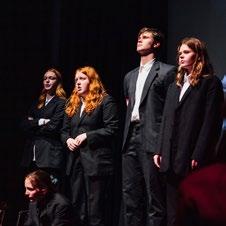
WHAT CAN YOU DO WITH THE QUALIFICATION?
A level Drama and Theatre can lead to a degree in drama at university. It is also an important qualification for those wishing to go to drama school, either as performers or designers/technicians. Beyond theatre itself, most employers now recognise the broader benefits the course brings such as developing self-confidence, the ability to express yourself in public and the acquisition of social skills.
WHAT DOES THE COURSE INVOLVE?
We follow the AQA Specification which is assessed through a combination of examinations and coursework.
A
LEVEL DRAMA & THEATRE (AQA: 7262)
Component 1 Drama and Theatre
Study of two set plays. Analysis and evaluation of the work of live theatre makers.
Component 2 Creating original drama Performance of devised drama (or design/ directing). Study of one prescribed practitioner.
Component 3 Making theatre (practical)
Study of a prescribed practitioner. Exploration and interpretation of 3 play extracts. Performance (design/director).
40% of A level Examination, externally set and assessed
30% of A level Internally assessed, externally moderated
30% of A level Externally moderated
Economics
WHY STUDY ECONOMICS?
The main approach to A level Economics is to apply economic theory to support analysis of current economic problems and issues, and encourage students to appreciate the interrelationships between microeconomics and macroeconomics. Students will review engaging and up-todate content so that they can relate what they are learning to the world around them – locally, nationally and globally.
WHAT WILL YOU NEED TO BE GOOD AT?
Students will need to be able to develop the knowledge and skills needed to understand and analyse data, think critically about issues and make informed decisions. They will also need to build upon their quantitative skills and appreciate that, when evaluating arguments, both qualitative and quantitative evidence are important.
HOW WILL YOU BE TAUGHT?
Classwork, questioning, problem-solving, practical work, demonstration, research from text books and other media for essays and presentations. There will be an emphasis on trying to explain, where possible, why things happen as well as how processes work. There is also an expectation that students will take on more responsibility for their own learning.
WHAT CAN YOU DO WITH THE QUALIFICATION?
A level Economics is a valuable introduction to students who want to study economics, finance or management at university. It also provides useful transferable skills applicable across a very wide range of careers – marketing and advertising, personnel and human resources, coaching, journalism, working in the voluntary sector, consultancy and accountancy.
WHAT DOES THE COURSE INVOLVE?
The course will follow the Edexcel Economics B specification. Exam papers use a variety of assessment styles including reallife case studies and data exercises to better prepare students for further study and employment.
ABOUT ECONOMICS B
Economics B comes from the Nuffield tradition, which emphasizes the use of business contexts, rather than abstract models, in delivering economics concepts. The course is structured into four themes, consisting of three externally examined papers.
Students are, introduced to economics by developing knowledge of core microeconomic and macroeconomic concepts, and by investigating economic theory through realworld businesses and the environments in which they operate.
In the second year of study, students will develop a range and depth of knowledge and understanding of complex, concepts and models and the ability to apply this in context, to case studies and current economic factors.
In assessments, students will be required to apply their knowledge and understanding to familiar and unfamiliar contexts and demonstrate an awareness of current economic events and policies.
A LEVEL ECONOMICS (EDEXCEL ECONOMICS B)
The A level Economics examinations assess students’ knowledge across four themes: Theme 1: Markets, consumers and firms Theme 2: The wider economic environment Theme 3: The global economy Theme 4: Making markets work
Content Overview Weighting Assessment
Paper 1
Markets and how they work
Paper 2
Competing in the global economy
Paper 1 will assess microeconomics and questions will be drawn from Themes 1 and 4.
35% of the total qualification
Paper 3
The economic environment and business
Paper 2 will assess macroeconomics and questions will be drawn from Themes 2 and 3.
35% of the total qualification
Each question is set in a context, drawing on topics from across Themes 1 and 4. Students answer all questions from all sections.
• Section A comprises one data response question broken down into a number of parts.
• Section B and Section C each comprise one extended openresponse question based on data.
• Duration: 2 hours.
• 3 questions.
• 100 marks available.
Each question is set in a context, drawing on topics from across Themes 2 and 3. Students answer all questions from all sections.
• Section A comprises one data response question broken down into a number of parts.
• Section B and Section C each comprise one extended openresponse question based on data.
• Duration: 2 hours.
• 3 questions.
• 100 marks available.
Paper 3 will assess content across all four themes.
Students are required to apply their knowledge and understanding, make connections and transfer higher-order skills across all four themes.
30% of the total qualification
• Section A will focus on the broad context provided in the prereleased document issued on our website in November of the previous year.
• Section B will focus on at least one strand within the context provided.
• Each section will contain unseen stimulus materials comprising quantitative and qualitative evidence. Students are required to apply their knowledge and understanding from Themes 1, 2, 3 and 4, and their understanding of the broad context to this evidence.
• Questions in Sections A and B are each broken down into a number of parts, including one extended open-response question.
• Duration: 2 hours.
• 2 questions.
• 100 marks available.
English Literature
LVI- FOUNDATIONS IN LITERARY COMPARISON AND INTERPRETATION
This group develops advanced analytical and comparative skills through the study of both modern and 19th-century texts. Students begin with an anthology of contemporary poetry, exploring how poets use language, form, and structure to express ideas, before comparing these with a range of unseen poems to develop confidence in independent interpretation. They then move on to the study of two prose texts- Dracula and The Little Stranger- examining how both authors use character, setting, and narrative voice to explore Gothic conventions, uncertainty, and the relationship between the past and the present. These texts form the foundation for comparative analysis in preparation for Paper 2.
In addition, students study A Streetcar Named Desire, focusing on dramatic methods, characterisation, and the tragic form. This introduces key concepts for Paper 1 and encourages close analysis of stagecraft and subtext.
Throughout the year, students also begin work on their NonExamination Assessment (coursework). They select two texts of their own choosing and develop an independently crafted comparative essay, allowing them to explore areas of personal interest and demonstrate their ability to form and sustain a critical argument.
UVI - SHAKESPEARE, ROMANTICISM, AND CRITICAL PERSPECTIVES
In UVI, students deepen their understanding of literary analysis through a focus on tragedy, critical theory, and broader interpretative approaches. The year begins with the study of Othello, where students explore Shakespearean tragedy in depth, examining character motivation, dramatic structure, and complex themes such as jealousy, power, and identity.
Alongside this, students engage with critical theory and critical writing, learning to apply a range of theoretical perspectives to texts. This helps to develop their evaluative skills and widens their understanding of how meaning is constructed and interpreted across time and context.
Students also study a selection of Romantic poetry, exploring key themes such as nature, the self, imagination, and revolution. This supports their preparation for the unseen poetry section of Paper 3 and reinforces key skills in poetic analysis, comparison, and historical contextualisation.
The year concludes with focused revision and refinement of all examined components, enabling students to consolidate their knowledge, strengthen their comparative writing, and prepare thoroughly for the final A level assessments.
“She has absolutely loved the teaching - she says she feels more confident in smaller classes and that her contributions are valued”
New Starters’ Survey
A LEVEL ENGLISH LITERATURE (EDEXCEL-PEARSON SPECIFICATION 9ET0)
Component 1 (9ETO/01)
Drama - Tragedy
Component 2 (9ETO/02)
Prose
Section A: One essay from a choice of two on Othello, linked to wider critical reading.
Section B: One essay, from a choice of two, on A Street Car Named Desire 35
One essay comparing two texts, from a choice of two questions, on A Little Stranger and Dracula.
Component 3 (9ETO/04)
Poetry
Component 4 (9ET0/03)
Coursework
Section A: One essay, from a choice of two, comparing an unseen poem written post-2000 in comparison with a named poem from a prescribed anthology: Poems of the Decade: a modern poetry anthology
Section B: One essay, from a choice of two, on either a selection of Romantic Poetry. 30 marks
One extended comparative essay, on two studentchosen texts, of 2500 to 3000 words.
Film Studies
WHY STUDY FILM STUDIES?
Many consider film to be the main cultural innovation of the 20th century and a major art form of the last hundred years. Those who study it characteristically bring with them a high degree of enthusiasm and excitement for what is a powerful and culturally significant medium, inspiring a range of responses from the emotional to the reflective. A level Film Studies makes an important contribution to the curriculum, offering the opportunity to investigate how film works both as a powerful agent of representation and as an aesthetic medium.
WHAT WILL YOU NEED TO BE GOOD AT?
First and foremost you must bring with you an interest in film. Successful students are likely to be those people who can’t help discussing and dissecting a film when they come out of the cinema; or those who seek out films beyond the mainstream Hollywood blockbusters because they like the director or are interested in the genre; or those who stay up until the early hours to watch the Academy Awards streamed live from America. An ability to analyse, interpret and discuss moving image texts is a must and a confident academic writing style is beneficial. You will also have an interest in film-making and good ICT skills, with a willingness to learn to use new software including industry standard video editing software.
HOW WILL YOU BE TAUGHT?
At least one lesson per week will involve actively viewing moving image texts from a variety of different genres and contexts and making detailed notes. The remaining exam preparation lessons will consist of lectures, debates, discussions, research and essay practice.
As well as this you will spend approximately 30% of the course creating your own short film, moving through research to pre-production, production, post-production and finally evaluation.
WHAT CAN YOU DO WITH THE QUALIFICATION?
The course is highly applicable to those who plan to enter the creative industries and the film industry in particular. However, A level Film Studies is well regarded by most higher education institutes (including Russell Group) and would benefit any student looking to pursue a degree or career which requires critical thinking and extended written analysis. The broad range of moving image texts studied, along with the historical, social and cultural elements of the subject, make film studies a flexible subject choice.
WHAT DOES THE COURSE INVOLVE?
We follow the WJEC (Eduqas) syllabus. The A level is assessed 70% by examination and 30% by practical coursework.
A LEVEL FILM STUDIES (WJEC EDUQAS SYLLABUS)
Content
Component 1
Varieties of Film and Filmmaking
Component 2 Global Filmmaking Perspectives
This component assesses knowledge and understanding of six feature-length films.
Section A: Hollywood 1930-1990 (comparative study) One question from a choice of two, requiring reference to two Hollywood films, one from the Classical Hollywood period (1930-1960) and the other from the New Hollywood period (1961-1990).
Section B: American film since 2005 /2012 (two-film study) One question from a choice of two, requiring reference to two American films, one mainstream film and one contemporary independent film.
Section C: British film since 1995 (two-film study) One question from a choice of two, requiring reference to two British films.
This component assesses knowledge and understanding of five feature-length films (or their equivalent).
Section A: Global film (two-film study) One question from a choice of two, requiring reference to two global films: one European and one produced outside Europe.
Section B: Documentary film One question from a choice of two, requiring reference to one documentary film.
Section C: Film movements – Silent cinema One question from a choice of two, requiring reference to one silent film or group of films.
Section D: Film movements – Experimental film (19602001) One question from a choice of two, requiring reference to one film option.
Weighting Assessment
35% of qualification Written examination: 2.5 hours
Component 2 Production
This component assesses one production and its evaluative analysis. Learners produce: • either a short film (4-5 minutes) or a screenplay for a short film (1600-1800 words) and a digitally photographed storyboard of a key section from the screenplay • an evaluative analysis (1600 - 1800 words)
35% of qualification Written examination: 2.5 hours
30% of qualification Nonexamination assessment
French
WHY STUDY FRENCH?
To gain a deeper knowledge of the French language, an awareness of French culture, history, current affairs and media and an insight into the world of work, leisure and contemporary issues in France. Students spend time in France at our exchange school, with the opportunity of work experience at the same time.
WHAT WILL YOU NEED TO BE GOOD AT?
A grade 6 or 7 at GCSE French is essential, grade 8 or 9 highly desirable. You must also be prepared to read a lot and analyse what you have read, so an interest in literature is useful.
Grammar is important at A level, so you need to be good at seeing how and why things fit together. You need to have good research and drafting skills in preparation for producing a high standard of work in the extended writing task.
All four skills (listening/reading/speaking/writing) will be assessed. Knowledge and understanding of the culture and society of the countries and communities where French is spoken will also be assessed.
Areas of study form two broad themes:
• Social issues and trends;
• Political, artistic and intellectual culture.
Learners will be required to study two works – one of which has to be a literary work - from a prescribed list and to respond critically and analytically to them in writing in French.
Students will be required to translate both from and into French and one of the sections of the speaking unit is a research-based project into an aspect of French culture.
HOW WILL YOU BE TAUGHT?
Lesson teaching is usually shared between two teachers. There will be class teaching, presentations by students, group work, video and listening comprehension, personal use of the internet for research and communication and one-to-one sessions with a teacher for conversation practice. There is also a language assistant (native speaker) who will give one-to-one practice and support.
WHAT CAN YOU DO WITH THE QUALIFICATION?
You can combine a language with many other subjects at university. With the ever-broadening job market in Europe (and the ever-increasing competition for those same jobs with people from all over Europe) it is a good idea to continue with a language to as high a level as you can.
WHAT DOES THE COURSE INVOLVE?
We follow the AQA Specification which is assessed through a combination of comprehension, writing and speaking assessments.
“St Chris offers stretch and challenge for those pupils who want and need it, but equally can offer the right level of support when needed”
Parents’ Survey
LEVEL FRENCH (AQA: 7652)
Title
Unit 1
Listening, reading and writing
Listening comprehension
Reading comprehension
Translation into English
Unit 2
Unit 3
Writing Critical essay on a prescribed film or a literary text (300 words)
Literary text essay on a prescribed literary text (300 words)
Speaking
Discussion with stimulus material.
Research project.
(80 marks)
Further Mathematics (Level 3 Advanced GCE)
WHY STUDY FURTHER MATHEMATICS?
If you are very skilled at mathematics then A level Further Mathematics gives you the opportunity to broaden and extend your understanding to other areas of the subject.
The Pearson Edexcel Level 3 Advanced GCE in Further Mathematics consists of four externally examined papers. Students must take Paper 1 and Paper 2, the two mandatory Core Pure papers, and two optional papers.
The study of A level Further Mathematics is essential for anyone wishing to study mathematics at degree level at one of the top universities. It is also advantageous (and sometimes required) for some other degrees such as engineering.
WHAT WILL YOU NEED TO BE GOOD AT?
You will need to study A level Mathematics as well. You will need to be very good at mathematics probably having gained a grade 8 or 9 for your GCSE. You will be fluent in the use of algebra and geometry plus enjoy problem solving.
HOW WILL YOU BE TAUGHT?
You will likely have two teachers for A level Further Mathematics. Lessons will tend to be more lecture and tutorial based. Students will need to spend considerably more time on independent practice outside of the classroom.
There is an option to take this course to AS Level with public examination assessment in the Summer Term of Year 12.
WHAT CAN YOU DO WITH THE QUALIFICATION?
There are an incredible number of options for mathematicians. A level Further Mathematics is widely acknowledged to be at the highest level academically as the syllabus touches on first year university mathematics and so is looked on favourably by many universities when making offers.
Recent St Chris students taking A level Further Mathematics have gone on to study physics with mathematics, architecture, engineering, environmental science, operations research, statistics, economics, philosophy, law as well as mathematics.
A LEVEL FURTHER MATHEMATICS (PEARSON
EDEXCEL SPECIFICATION 9FM0)
Title
Paper 1:
Core Pure Mathematics 1
Paper 2:
Core Pure Mathematics 2
Proof, Complex numbers, Matrices, Further algebra and functions, Further calculus, Further vectors, Polar coordinates, Hyperbolic functions, Differential equations
Each paper is: 25% of the qualification
75 marks each
Each paper is: 1 hour and 30 minutes written examination
Paper 3: Further Mathematics Option 1
Students take one of the following four options:
A: Further Pure Mathematics 1
B: Further Statistics 1
C: Further Mechanics 1
D: Decision Mathematics 1 25% of the qualification
marks Written examination: 1 hour and 30 minutes
Paper 4: Further Mathematics Option 2
Students take one of the following seven options:
A: Further Pure Mathematics 2
B: Further Statistics 2
C: Further Mechanics 2
D: Decision Mathematics 2
25% of the qualification 75 marks
Written examination: 1 hour and 30 minutes
Geography
WHY STUDY GEOGRAPHY?
Geography is a dynamic subject that has to keep changing as the world around us keeps changing. Now, more than ever, it is essential that we understand how humans interact with the natural environment if we are to protect the world from irreversible damage and give all inhabitants a high quality of life.
Some of the questions that this course will help you to answer are:
• How do hazards turn into disasters?
• Who are the winners and losers of Globalisation?
• How will climate change affect our coastlines?
• Is regeneration always successful?
WHAT WILL YOU NEED TO BE GOOD AT?
To successfully study A Level Geography you need to have a real enthusiasm for the subject and good general geographical knowledge and understanding.
During the two-year course, you will develop the ability to:
• Analyse information in the form of maps, photos, articles and statistics;
• Consider all viewpoints on geographical issues;
• Empathise with people from other communities;
• Present data in a variety of formats;
• Present well-structured, reasoned arguments.
It is advantageous but not completely essential that you have studied Geography GCSE in order to complete the A level.
HOW WILL YOU BE TAUGHT?
You will be taught by two subject specialists who divide the course between them into physical and human geography.
Lessons will involve a range of learning styles, including: fieldwork; decision-making exercises; geographical enquiry; note-taking; case studies; statistical analysis; watching videos and self-directed study. You will be set one written assignment per week by each teacher, but will be expected to supplement this with your own background research.
WHAT CAN YOU DO WITH THE QUALIFICATION?
Geography combines elements of both sciences and arts, so is an ideal preparation for any degree course.
It can lead particularly well into employment in the following areas: travel and tourism; environmental management; meteorology; town & country planning; teaching; geological and oil research; hydrological engineering; land management; forestry; logistics.
Geographers are also a very employable group, owing to the broad range of research and analytical skills which they develop throughout the course.
WHAT DOES THE COURSE INVOLVE?
We follow the Pearson-Edexcel specification which is assessed through a combination of examinations and coursework.
A LEVEL GEOGRAPHY (PEARSON EDEXCEL SPECIFICATION 9GE0)
Content Assessment
Topic 1 Tectonic processes and hazards
Topic 2 (B) Coastal landscapes and change
Topic 5 The water cycle and water insecurity
Topic 6 The carbon cycle and energy insecurity
Topic 3 Globalisation
Topic 4 (A) Regenerating places
Topic 7 Superpowers
Topic 8 (B) Migration, identity and sovereignty
Paper 1 (9GEO/01) 2 hour written examination
Students answer all questions in Section A and a choice of Question on either Glacial Landscapes or Coastal Landscapes in Section B
Paper 2 (9GEO/02) 2 hour written examination
Students answer all questions in Section A & C. One question from Section B and one question from Section D
This paper contains three synoptic themes Players / Attitudes and Actions / Futures and Uncertainties. The synoptic questions will be based on a geographical issue.
Paper 3 (9GEO/03) 1 hour 45 mins written examination with accompanying Resource Booklet
Students answer all questions
Coursework/Investigation
The student defines a question or issue for investigation, relating to the compulsory or optional content. The topic may relate to any aspect of geography contained within the specification. The student’s investigation will incorporate fieldwork data, own research, and use of secondary data.
Paper 4 (9GEO/04) Non-examined assessment
The investigation will be internally assessed and externally moderated
20% of qualification
History
WHY STUDY HISTORY?
History is an art form which uses some scientific methods. If you find people and the enormous diversity of things they have achieved, fought over, struggled for and believed in interesting, and if you want to understand more about the world today, A level History is for you. We study the AQA syllabus with modules on The British Empire from 1857 to 1967 and Revolution and Dictatorship in Russia from 1917 to 1953.
WHAT WILL YOU NEED TO BE GOOD AT?
Problem-solving and decision-making; developing presentational skills both in discussion and on paper; broadening awareness of human psychology; studying topics or good narratives in depth; learning about and from different cultures; exploring the role of individuals, ideas and groups in historical development; understanding the relationship of past and present and the connection between historical change and different disciplines; acquiring an understanding of the philosophy of history. Ability to listen and hear the sources of the past; ability to produce a coherent developed analysis on paper; an open minded, sceptical, questioning approach to topics; an eye for detail; imagination and sensitivity; disciplined study skills; courage in the face of challenges and uncertainty; an interest in the wider community; an enjoyment of reading, discussion, debate and research.
HOW WILL YOU BE TAUGHT?
Lessons are a mix of formal explanations, audio-visual presentations, debates, discussions, question and answer sessions, source analysis and exercises designed to increase understanding of the objectives being assessed. Students will note, research and answer questions on nearly all the key topics. There will be regular essays. Presentations may be made by students as well as staff. However structured the sessions, there will always be a lot of scope for individual participation.
WHAT CAN YOU DO WITH THE QUALIFICATION?
Any student coping successfully with an A level syllabus will acquire a wide-range of transferable skills useful in the law, education, media and journalism, business and public administration, humanitarian work – indeed in any experience involving interaction with people. A level History is highly regarded by university departments in general, but especially those concerned with the media, education, public administration, management, law, sociology, geography, psychology, politics, international history and international relations. The disciplines involved are well understood. It is also a subject welcomed by nursing courses and others preparing students for care-work.
WHAT DOES THE COURSE INVOLVE?
We follow the AQA Specification 7042, which is assessed through a combination of examinations and coursework.
“The atmosphere was created for the students –of acceptance and commitment to investing in their community and the world”
New Starters’ Survey
A LEVEL HISTORY (AQA SPECIFICATION 7042)
Title Content Overview
1J The British Empire, 1857 to 1967
2N Revolution and dictatorship: Russia, 1917–1953
A breadth study on issues of change, continuity, cause and consequence during the British Empire.
Weighting Assessment
40% of A-level Written exam: 2 hours 30 minutes.
One compulsory question linked to historical interpretations (30 marks).
Choice of two out of three essays (2x25 marks).
Component 3: Historical investigation (nonexam assessment)
A depth study on the coming and practice of communism in Russia.
The Historical investigation is an independently researched piece of extended writing.
40% of A level
Written exam: 2 hours 30 minutes.
One compulsory question linked to primary sources or sources contemporary to the period (30 marks).
Choice of two out of three essays (2x25 marks).
20% of A level 3500-4500 word piece of extended writing.
40 marks
Mathematics
(Level
3 Advanced GCE)
WHY STUDY MATHEMATICS?
In A level Mathematics you will meet new and powerful ideas, which have both intrinsic interest and wide applicability. The studies will develop your analytical and problemsolving skills, attributes much sought after by employers and universities. In pure mathematics, you will build on the algebra, trigonometry and co-ordinate geometry from GCSE and then meet new topics of differential and integral calculus. In mechanics you will learn how to model important physical situations involving forces and motions. In statistics you will carry on from GCSE looking at how statistical analysis can be used to analyse data and how probability is used to model situations to help make decisions.
WHAT WILL YOU NEED TO BE GOOD AT?
You should have preferably a grade 7 - 9 in GCSE Mathematics. You need extremely strong algebraic skills in particular. You need to be prepared to work hard throughout the course, to complete written assignments on time, and to ask for help early enough for that help to be useful.
HOW WILL YOU BE TAUGHT?
You will have two teachers for A level Mathematics. Lessons will be in much the same style as for GCSE although students will need to spend more time on independent practice outside of the classroom.
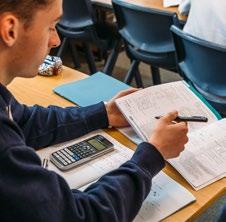
WHAT CAN YOU DO WITH THE QUALIFICATION?
A level Mathematics is essential for studying mathematics, statistics, the physical sciences (e.g. physics or engineering) and often economics at university, but is also viewed favourably as a qualification by a wide range of employers and by Admissions Tutors for many other university courses.
Many careers can follow from the study of mathematics including work in research; the sciences; accountancy; legal & financial professions; management & business; engineering and teaching.
“It’s a school that meets the student ‘where they are at’ and allows them to be themselves, while supporting them to perform well as well as being happy at school”
Parents’ Survey
A LEVEL MATHEMATICS (PEARSON EDEXCEL SPECIFICATION 9MA0)
Title
Paper 1: Pure Mathematics 1
Paper 2: Pure Mathematics 2
Content Overview
Topic 1 – Proof
Topic 2 – Algebra and functions
Topic 3 – Coordinate geometry in the (x, y) plane
Topic 4 – Sequences and series
Topic 5 – Trigonometry
Topic 6 – Exponentials and logarithms
Topic 7 - Differentiation
Topic 8 – Integration
Topic 9 – Numerical methods
Topic 10 – Vectors
Paper 3: Statistics and Mechanics
Section A: Statistics
Topic 1 – Statistical sampling
Topic 2 – Data presentation and interpretation
Topic 3 – Probability
Topic 4 – Statistical distributions
Topic 5 – Statistical hypothesis testing
Section B: Mechanics
Topic 6 – Quantities and units in mechanics
Topic 7 – Kinematics
Topic 8 – Forces and Newton’s laws
Topic 9 – Moments
Weighting Assessment
Each paper is: 33.33% of the qualification
100 marks each
Each paper is: 2-hour written examination
33.33% of the qualification
100 marks 2-hour written examination
Music
WHY STUDY MUSIC?
A level Music is a great course which provides a contemporary, accessible and creative education in music with an integrated approach to the three main elements –performing, composing and appraising.
The course explores musical context, musical language and performance and composition skills. Pupils will be encouraged to be creative and to broaden their musical horizons and understanding.
A level music requires students to develop an in-depth knowledge and understanding of musical elements, musical contexts and musical language.
There are six areas of study:
1. Instrumental music of Haydn, Mozart and Beethoven
2. Popular song: Blues, jazz, swing and big band
3. Instrumental jazz from 1910 to the present day
4. Religious music of the Baroque Period
5. Programme music 1820-1910
6. Innovations in music from 1900 to the present day
The course will enable you to explore performance and composition in greater detail and you will be able to choose a specialism, with a greater weighting on either performing or composing, depending on which of these best suits you.
WHAT WILL YOU NEED TO BE GOOD AT?
You will need to enjoy playing your instrument (or voice) confidently and be able to perform to a high standard (approximately grade 6 or higher equivalent). You should be able to experiment with ideas on your instrument in order to help you compose original music and you should ideally have grade 7 - 9 in GCSE Music.

HOW WILL YOU BE TAUGHT?
In small groups using the facilities of the Music Department. Some of the lessons will involve practical work and you should take individual lessons on at least one instrument (or your voice). There will be joint work and ensemble activities but also the need to enjoy independent learning in certain situations. Significant time will be spent on learning about new music and understanding how compositions were created and how they connect to the conventions of their time and culture. There will be written assignments to complete where you will need to be able to appraise contrasting genres, styles and traditions of music.
WHAT CAN YOU DO WITH THE QUALIFICATION?
A level Music provides a full foundation for study at Higher Education level, including conservatoires and universities. There are many varied university courses you can consider from performance and composition through to sound and studio reproduction, film production, the recording industry and teaching among others. These types of courses will lead to working in very interesting and challenging working environments.
A LEVEL MUSIC (OCR SPECIFICATION H543)
Pupils take components: 01, 03, and 05; OR 02, 04 and 05.
Title
Performing A (01)
Content Overview
Recital – minimum of 6 minutes and two contrasting pieces
Choice of:
• solo piece(s) on one or more instruments or voice
• ensemble performance (including accompanying)
• realisation using music technology
Performing B (02) Recital – minimum of 10 minutes and three contrasting pieces
Choice of:
• solo piece(s) on one or more instrument or voice
• ensemble performance (including accompanying)
• realisation using music technology
Section 1: Free Choice
Section 2: Focused Study
Composing A (03) Compositions with a combined duration of at least 8 minutes
• One to a brief set by OCR
• One to a brief written by the learner
• Three short technical exercises
Composing B (04) Compositions with a combined duration of at least 4 minutes
• One to a brief set by OCR
• One to a brief written by the learner
Weighting Assessment
25% of A level
Recital
75 Marks
Non-exam assessment – externally assessed via audio-visual recording
35% of A level
Recital
105 Marks
Non-exam assessment – externally assessed via audio-visual recording
35% of A level
Listening and appraising (05)
• Analysing and evaluating music
• Familiar and unfamiliar pieces
• Prescribed works
• Questions based on aural extracts
25% of A level
Compositions accompanied by a score, lead sheet or written description
105 Marks
Non-exam assessment – externally assessed via audio recordings
Compositions accompanied by a score, lead sheet or written description
75 Marks
Non-exam assessment – externally assessed via audio recordings
40% of A level
Written exam including aural extracts
120 Marks
2 hour and 30 minutes written exam
Philosophy
WHY STUDY PHILOSOPHY?
A level Philosophy is designed to give students a thorough grounding in the key concepts and methods of philosophy. Students will have the opportunity to engage with big questions such as what we can know and how we should live (among others). Students will develop important skills that they need for progression to higher education. They’ll learn to be clear and precise in their thinking and writing. They will analyse and evaluate the arguments of others as well as constructing and defending their own arguments.
WHAT WILL YOU NEED TO BE GOOD AT?
Students are required to demonstrate knowledge and understanding of the content, including through the use of philosophical analysis (conceptual analysis and argument analysis). They must also be able to analyse and evaluate the philosophical arguments within the subject content to form reasoned judgements.
HOW WILL YOU BE TAUGHT?
Lessons are a mix of formal explanations, audio-visual presentations, debates, discussions, question and answer sessions, source analysis and exercises designed to increase understanding of the objectives being assessed. Students will note, research and answer questions on nearly all the key topics. There will be regular exam style questions and essays. Presentations may be made by students as well as staff. However structured the sessions, there will always be a lot of scope for individual participation, as questioning is the key to philosophy!
WHAT CAN YOU DO WITH THE QUALIFICATION?
Philosophy allows you to consider the big questions in life and teaches you how to analyse and communicate ideas logically, which are skills that many employers value. Any student coping successfully with an A level syllabus will acquire a wide-range of transferable skills useful within law, education, media and journalism, business and public administration, humanitarian work – indeed in any experience involving interaction with people. A level Philosophy is highly regarded by university departments in general, but especially those concerned with the media, education, public administration, management, law, sociology, geography, psychology, politics, history and many more.
WHAT DOES THE COURSE INVOLVE?
The course follows the AQA specification 7172, which is assessed through a series of examination questions ranging from low mark paragraph answers to higher mark extended writing answers.
A LEVEL PHILOSOPHY (AQA SPECIFICATION 7172)
Title
Paper 1 Section A: Epistemology
Paper 1 Section B: Moral Philosophy
Content Overview
1. What is knowledge?
2. Perception as a source of knowledge
3. Reason as a source of knowledge
4. The limits of knowledge
1. Normative ethical theories
2. Applied ethics
3. Meta-ethics
4. Moral realism/ moral anti-realism
Paper 2 Section A: The metaphysics of God
Paper 2 Section B: The metaphysics of mind
1. The concept and nature of ‘God’
2. Arguments relating to the existence of God
3. The problem of evil
4. Religious language
1. What do we mean by ‘mind’?
2. Dualist theories
3. Physicalist theories
4. Functionalism
Weighting Assessment
50% of A level 3 hour written exam
100 marks
5 questions on epistemology
5 questions on moral philosophy
50% of A level 3 hour written exam
100 marks
5 questions on the metaphysics of God
5 questions on the metaphysics of mind
Physics
WHY STUDY PHYSICS?
Physics is at the heart of everything and is the basis of all the natural sciences. We live in a society that is entirely based on science, technology and engineering. This means that physics is the future and is a highly rewarding discipline to study. Physics answers the big questions, like how does everything in the universe work? From quantum particles to galaxies, from Hollywood special effects to nuclear accelerators and the Higgs boson, from living things to nanotechnology robots, from thought processes to the eye of a storm, it’s all physics. If you have an enquiring mind, always asking why things happen, then physics will help you find the answers.
Physics is one of the most challenging but also highly regarded subjects, it has always been at the frontier of mankind’s knowledge and continually pushes the boundaries.
WHAT WILL YOU NEED TO BE GOOD AT?
A grade 6 or above in two science GCSEs and in GCSE Mathematics is essential. If you want to study physics at university you must take A level Mathematics.
The main skills developed in the subject are:
• A logical and numerate mind
• The ability to solve problems related to the physical world
• The ability to make analogies and think creatively outside the everyday
• Communication skills both written and verbal
• Computing and practical measuring skills
• Teamwork and flexibility in lab work and projects
HOW WILL YOU BE TAUGHT?
A mixture of practical work, interactive software, videos, class teaching and discussion, note-taking, problem-solving and so on. There are regular tests to check you are on course. There is also an expectation that students will take on more responsibility for their own learning and maintain deadlines. Physics is taught in a supportive environment where you will learn and improve from your mistakes.
WHAT CAN YOU DO WITH THE QUALIFICATION?
Physics opens doors to a wide variety of careers. The opportunities available are as vast as the subject itself due, in part, to the transferable skills gained whilst studying physics. Employers see a physics qualification as an indication of someone who will be an asset to them.
A level Physics is the basis for most engineering courses, essential for astronomy, particle physics research, material science, electronics and IT and desirable in medicine, industrial research, and some financial service industries. Often it is the discriminating qualification that sets you apart from the crowd.
WHAT DOES THE COURSE INVOLVE?
We follow the OCR H556 Specification. Students will study modules 1 to 4 in Year 12 and then continue with modules 5 and 6 in Year 13. The internally assessed Practical Endorsement Skills also form part of the A level and are assessed throughout the written examinations, but also in 12 practical activities to be undertaken throughout the course.
A LEVEL PHYSICS (OCR SPECIFICATION H556)
Module Title
Module 1 – Development of practical skills in physics
Module 2 – Foundations of physics
Module 3 – Forces and motion
Module 4 – Electrons, waves and photons
Module 5 – Newtonian world and astrophysics
Module 6 – Particles and medical physics
Component 01: Modelling Physics - testing Modules 1, 2, 3 and 5
2 hours 15 minutes written paper: 100 marks
Component 02: Exploring Physics - testing Modules 1, 2, 4 and 6.
2 hours 15 minutes written paper: 100 marks
Component 03: Unified Physics – testing all Modules (1 to 6)
1 hour 30 minutes written paper: 70 marks
Component 04 (non-exam assessment)
The Practical Endorsement can form part of the A level. A level students only can be entered for Component 04.
‘Practical endorsement in Physics’ and the grade in their final award is endorsed accordingly. This is teacher assessed and evidenced.
of total A level
This will be a separately reported result
Politics
WHY STUDY POLITICS?
Lively, relevant, controversial… there are many ways to describe A level Politics. Politics is an engaging and valuable A Level whether you come at it as a fully-fledged ‘politico’ or someone looking to grow their knowledge in the field. Covering news and current affairs from the UK and US, it helps you understand how the UK country is run and develops research, written communication and debate skills. It also helps grow your confidence as you navigate and argue new ideas.
WHAT WILL YOU NEED TO BE GOOD AT?
For A level Politics it’s important that you are passionate about having an opinion. This is a problem solving and decision making course where communication in discussion and written form are crucial. Literacy is a significant element of the course which is grounded in essay based assessment. You will need to present your ideas and opinions to your peers whilst also listening and appreciating difference. An interest in the structures and governing of countries is important, or more broadly in justice and fairness in our governing system. We cover politics in three ways throughout the course; government and politics of the UK, government and politics of the USA and comparative politics and different political ideas (socialism, liberalism and conservatism).
HOW WILL YOU BE TAUGHT?
There will be ample support for you throughout the Politics A level. Lessons will be embedded in understanding and discussion to enable students to acquire knowledge, and debate to enhance evaluation skills. This is an essay based course so you will receive sessions on how to structure essays and communicate effectively in a written format. There will be presentations by both student and teachers.
WHAT CAN YOU DO WITH THE QUALIFICATION?
Studying A level Politics is ideal if you’re considering studying politics, sociology, ethics, advertising or journalism at university, and is highly regarded by employers in industries including politics, international organisations, the media, government and the civil service. Additionally, if you are interested in A level History, Politics works as a supportive A level as it can help you understand tricky political concepts grounded in historical debate.
“To focus on each individual’s strengths and abilities whether academic or otherwise, whilst maintaining a healthy respect for others. To encourage independence and have the confidence to be different”
Parents’ Survey
A LEVEL POLITCS (AQA SPECIFICATION 7152)
Module Title Assessment
Government and Politics of the UK
Paper 1
Written exam
77 marks
A mixture of medium length ‘explain’ and essay style questions.
33.3% of total A level
The Government and Politics of the USA and Comparative Politics
Paper 2
Written exam
77 marks
2 hours
A mixture of medium length ‘explain’ and essay style questions.
33.3% of total A level
Political Ideas
Paper 3
Written exam
77 marks
2 hours
A mixture of medium length ‘explain’ and essay style questions.
33.3% of total A level
Psychology
WHY STUDY PSYCHOLOGY?
A level Psychology attempts to unravel the complexities of human behaviour. We will explore issues such as whether psychologists can improve the accuracy of eyewitness testimony, how the bond between mother and child influences the child’s emotional development and why people conform. During the second year there will be the opportunity to examine some of the topics in more depth including the psychology of addiction, the causes and treatments for schizophrenia and relationships. The course will include the opportunity for students to take part in a range of practical research activities and develop an understanding of psychological investigations.
WHAT WILL YOU NEED TO BE GOOD AT?
No prior knowledge of psychology is required for this course, although an interest in human behaviour is an advantage. During the course you will need to be able to communicate your ideas and develop clear lines of argument, so a grade 6 or above in GCSE English would be an advantage. The course will involve carrying out a number of experiments and other pieces of research, so it would also be an advantage to have mathematical skills in order to analyse the results, and carry out some simple statistical calculations.
HOW WILL YOU BE TAUGHT?
During the lessons there will be many opportunities for discussion. A wide range of sources of information will be explored, including videos, newspaper and journal articles and the Internet. Most of the topic areas will involve practical investigations and experiments to be carried out both within and outside the classroom. Students will be expected to take notes, complete written homework and carry out background reading on the topics covered in the class.
WHAT CAN YOU DO WITH THE QUALIFICATION?
There are very few areas of human life and work where psychology does not provide insight. A level Psychology is accepted as an entry qualification to a wide range of higher education courses and provides a helpful background for courses as diverse as English, business studies and occupational therapy. For those that go on to complete a degree in psychology there is a range of career opportunities which include professional training, for instance: clinical psychologist, educational psychologist, forensic psychologist and occupational psychologist.
WHAT DOES THE COURSE INVOLVE?
Students study 11 modules for the A level.
ASSESSMENT OVERVIEW
All papers will include multiple choice, short answer and extended writing questions.
A LEVEL PSYCHOLOGY (AQA SPECIFICATION 7182)
Module Title
Module 1 – Social Influence
Module 2 – Memory
Module 3 – Attachment
Module 4 – Psychopathology
Module 5 – Approaches in Psychology
Module 6 – Biopsychology
Module 7 – Research Methods including the scientific process, data handling and analysis, inferential testing
Module 8 – Issues and Debates in Psychology
Module 9-11 – Option 10 Gender
Module 12-14 – Option 12 Schizophrenia
Module 15-17 – Option 17 Psychology of Addiction
Written Paper 1
Introductory Topics in Psychology
96 marks 2 hours
Written Paper 2
Psychology in Context
96 marks
2 hours
Written Paper 3 Issues and Options in Psychology
96 marks
2 hours
Spanish
WHY STUDY SPANISH?
You will have the opportunity to discuss contemporary issues in Spanish and enrich your knowledge of Spanish culture and civilization. At the end of the course your good linguistic skills and deeper understanding of Spanish-speaking countries will make you a valuable and interesting partner for discussion.
Spanish is an increasingly popular language, spoken by 350 million people in the world, in Spain and also in Central and South America.
WHAT WILL YOU NEED TO BE GOOD AT?
A grade 6 or 7 at GCSE Spanish is essential, grade 8 or 9 highly desirable. You will have to read a lot (newspaper articles, literature etc.) in order to deepen your knowledge of Spanish-speaking cultures. You will need to learn grammatical concepts essential to making your writing richer and more like that of a native speaker.
All four skills (listening/reading/speaking/writing) will be assessed alongside your knowledge and understanding of the culture and society of the countries and communities where Spanish is spoken.
Areas of study form two broad themes:
• Social issues and trends;
• Political, artistic and intellectual culture.
Learners will be required to study two works – one of which has to be a literary work - from a prescribed list and to respond critically and analytically to them in writing in Spanish. Students will be required to translate both from and into Spanish and one of the sections of the speaking unit is a research-based project into an aspect of Spanish culture.
HOW WILL YOU BE TAUGHT?
The teaching will be more formal for the learning of grammar, as good linguistic skills will enhance your communicative ability. It will involve video and listening comprehension as well as group discussions and discussions led by individual students about current issues and literature. There will also be personal use of the internet for research and communication and one-to-one sessions with a teacher.
There is also a language assistant (native speaker) who provides one-to-one practice and support.
WHAT CAN YOU DO WITH THE QUALIFICATION?
Within the modern world there is an increasing emphasis in business on fluency in a European language, so knowledge of Spanish will be helpful in both business and in other global contexts.
WHAT DOES THE COURSE INVOLVE?
We follow the AQA Specification which is assessed through a combination of comprehension, writing and speaking assessments.
A LEVEL SPANISH (AQA: 7692)
Unit 1
Listening, reading and writing
Unit 2 Writing
Unit 3
Speaking
Listening comprehension
Reading comprehension
Translation into English
Critical essay on a prescribed film or a literary text (300 words)
Literary text essay on a prescribed literary text (300 words)
Discussion with stimulus material.
Research project.
(80 marks)
(60 marks)
Digital Music Production (Level 3 Diploma)
WHY STUDY BTEC DIGITAL MUSIC PRODUCTION?
Studying BTEC Level 3 in Digital Music Production will give you the opportunity to develop essential skills through practical learning and workshops with industry professionals. This size of qualification allows learners to study related and complementary qualifications without duplication of content. It provides good preparation for learners considering an apprenticeship in digital music production. When taken alongside further Level 3 qualifications, it supports access to a range of higher education courses in music production and the wider music industry.
WHAT WILL YOU NEED TO BE GOOD AT?
You will need to have a combination of creativity, dedication and be able to be able to work both independently and collaboratively as part of a team. A willingness to receive and apply constructive feedback to enable you to grow as a producer and a composer is essential. This course is suitable for those students who prefer a coursework / assignmentbased approach over an exam based approach.
HOW WILL YOU BE TAUGHT?
Most lessons will be taught through a combination of hands-on assignments, research based tasks, collaborative projects and theoretical lessons. You will work on a number of assignments to create an individual portfolio of tasks and research articles. The curriculum includes insights from guest speakers and industry professionals, providing valuable realworld perspectives on the production industry. Additionally, you will participate in feedback sessions that foster growth through constructive critique, alongside studying the history and context of various technologies and principles of digital music production.
UNIT INFORMATION
Students must study these compulsory units:
• Digital Audio Workstation (DAW) Production - 15 hour practical examined unit
• Music for Sound
• Media
Students must study three out of four of these options units:
• Creative Synthesis and Sampling
• Remixing and Reworking
• Mixing and Mastering Techniques
• Commercial Music Production

Food Science & Nutrition Level 3 Alternative Academic Qualification
WHAT WILL I LEARN ON THIS COURSE?
This qualification provides an in-depth understanding of food science, nutrition, and their application in real-world contexts. You will explore the relationship between diet and health, food safety, and the development of innovative food products. The course combines academic theory with practical skills, preparing you for higher education or careers in areas such as dietetics, food science, public health, and product development.
YOU WILL STUDY:
• Nutritional needs across the life stages
• Practical food production skills
• Principles of food hygiene and food safety
• Optional units on food experimentation or current issues in food science and nutrition
HOW WILL I BE
ASSESSED?
Assessment is a combination of written examinations and non-examined assessments (coursework):
In Year 12:
• Unit 1: Nutritional needs across the life stages –Written exam (1 hr 30 mins) – 25%
• Unit 2: Developing practical food production skills –Internal assessment – 25%
In Year 13:
• Unit 3: Principles of food hygiene and food safety –Written exam (1 hr 30 mins) – 25%
• Plus one optional unit (Unit 4: Experimenting to solve food production problems OR Unit 5: Current issues in food science and nutrition) – Internal assessment – 25%
HOW IS THIS COURSE DELIVERED?
The course is taught through a mix of classroom-based theory, practical sessions in a fully equipped kitchen, and independent research. You will develop advanced cooking techniques, understand food safety legislation, and apply scientific principles to food production.
WHAT CAN I DO AFTER THIS COURSE?
This qualification supports progression to higher education courses such as:
• BSc Food and Nutrition
• BSc Human Nutrition
• BSc Public Health Nutrition
• BSc Food Science and Technology
It is also relevant for careers in:
• Dietetics and nutrition consultancy
• Food product development
• Public health and food policy
• Catering and hospitality management
For further information contact: Becky Belson becky.belson@stchris.co.uk
LEVEL 3 ALTERNATIVE ACADEMIC QUALIFICATION (EXTENDED CERTIFICATE) EXAM
BOARD: WJEC
Title Content Overview
1. Meeting the nutritional needs of specific groups
This unit enables students to demonstrate an understanding of the science of food safety, nutrition and nutritional needs in a wide range of contexts, and through on–going practical sessions, to gain practical skills to produce quality food items to meet the needs of individuals.
Structure Assessment
Mandatory
External assessment:
• 90-minute examination; plus 15 minutes reading time
• 90 marks
• Three sections on each paper
• The paper will be graded Level 3 Pass, Level 3 Merit and Level 3 Distinction
Internal assessment:
• A practical food assignment based on a set task
2. Ensuring food is safe to eat
3. Experimenting to solve food production problems
To assess all A level subject content. Question types; a range of questions to include data response, short and extended answers.
4. Current Issues in Food Science and Nutrition
Either Unit 3 or Unit 4 will be completed.
The optional units allow students to develop their understanding of food preparation, consumer choices and the science of food safety and hygiene; essential knowledge for anyone involved in food production in the home or wishing to work in the food industry.
Practical sessions support the gaining of theoretical knowledge and ensure learning is an active experience.
These units allow students the opportunity to study subjects of particular interest or relevance to them, building on previous learning and experiences.
Mandatory An assignment produced each academic year on 1st May.
An 8 hour timed supervised assessment.
Optional Non-exam assessment.
Optional Internal assessment for either of the units is by controlled assessment assignment.
The assessments are graded Level 3 Pass, Level 3 Merit and Level 3 Distinction.
Performing Arts (Level 3 Diploma)
WHY STUDY PERFORMING ARTS?
The BTEC Extended Certificate is equivalent to one A Level and is designed for students who have a keen interest in developing their skills in the performing arts. The course blends practical exploration with critical analysis, offering opportunities to perform, create, and reflect on professional practice.
WHAT WILL YOU NEED TO BE GOOD AT?
You will need a combination of creativity, dedication, and strong communication skills. Being able to express emotions and ideas effectively is crucial, as is the ability to work collaboratively with others in a team setting. A willingness to receive and apply constructive feedback will help you grow as a performer. Additionally, developing discipline and time management skills will be essential for balancing rehearsals, performances, and coursework. Lastly, a passion for storytelling and an openness to explore diverse characters and styles will enrich your learning experience and enhance your performances.
WHAT CAN YOU DO WITH THE QUALIFICATION?
With a Level 3 BTEC in Performing Arts, you have a variety of exciting career paths and opportunities ahead of you. You can pursue further education at universities or drama schools, focusing on acting, theatre studies, or performing arts management. Career options include working as an actor in theatre, film, or television, as well as roles in directing, producing, or stage management. You might also explore opportunities in teaching drama, arts administration, or community theatre. Additionally, the skills gained from this qualification—such as creativity, teamwork, and communication—are highly transferable, allowing you to consider careers in fields like media, event management, and marketing. Overall, a Level 3 BTEC in Performing Arts provides a solid foundation for a diverse range of opportunities in the creative industries.
STRUCTURE OF THE QUALIFICATION:
Students will complete four units across the two years. Three are mandatory, and one is optional. At least two of the mandatory units are assessed externally.
LEVEL 3 DIPLOMA IN PERFORMING ARTS (PEARSON)
Title Content Overview
Mandatory Units –learners complete and achieve all units
Developing Skills and Techniques for Live Performance (60 GLH) – Internal
Practical unit focusing on developing performance skills and techniques in a selected discipline through workshops and rehearsals, leading to live performance.
Group Performance Workshop (120 GLH) –External, synoptic
Weighting Assessment
Learners work collaboratively to create and perform a piece in response to a stimulus, reflecting professional practice. 60 Mandatory 120 Mandatory Performance and coursework.
Optional Unitschoose one, 60 GLH
Unit 19: Acting Styles
Unit 20: Developing the Voice for Performance
Unit 21: Improvisation
Unit 22: Movement in Performance
Unit 23: Physical Theatre Techniques
Unit 24: Theatre Directing
Unit 25: Scriptwriting
Unit 26: Film and Television Acting
Unit 27: Musical Theatre Techniques
Unit 28: Variety Performance
Unit 29: Storytelling
Unit 30: Audio Performance
(The school will confirm which optional unit is offered each year depending on staffing expertise and cohort interests.)
Assessment is a balance of practical performance, written assignments, and externally set tasks. External assessments make up just under half of the qualification, ensuring a rigorous standard while retaining flexibility and creativity in learning.
Sport (Level 3 National Extended Certificate)
WHY STUDY PE/SPORT?
Studying the BTEC Level 3 National Extended Certificate in Sport is a great choice for students interested in developing their knowledge of the sports industry and pursuing a career in sports-related fields. The course combines practical elements such as fitness training and coaching, with theoretical components like anatomy, physiology, and sports psychology. This balance between practical and theoretical helps students develop well-rounded knowledge and skills. The industry–relevant skills equips you with leadership, teamwork, communication, and critical thinking skills.
Completing this course is equivalent to one A level, meaning it can contribute to UCAS points for university entry. It can be a stepping-stone to study sport science, physiotherapy, sports coaching, or physical education at degree level. If you have a passion for sport and enjoy learning through practical activities combined with academic study, this course can open doors to exciting future opportunities.
WHAT WILL YOU NEED TO BE GOOD AT?
To succeed in studying BTEC Level 3 National Extended Certificate in Sport, there are several skills and attributes that will be helpful. This course requires a lot of independent work, including completing assignments and projects. Therefore being organised will help you manage deadlines and juggle both the practical and theoretical aspects of the course. You will also need a combination of practical skills in sport, communication skills and good teamwork and leadership as well as analytical and critical thinking. Additionally, a passion for health, fitness and sports science will make the course more enjoyable and engaging.
WHAT CAN YOU DO WITH THE QUALIFICATION?
BTEC Level 3 National Extended Certificate in Sport is a fantastic stepping-stone into both further education and the workforce, making it ideal for those passionate about sport and physical activity.
The qualification is versatile as it can open doors to various opportunities in education and employment. You can progress to higher education in courses such as sports science, sports coaching and development, physical education (teaching), physiotherapy, sports and exercise psychology, strength and conditioning and leisure and recreation management.
HOW WILL YOU BE TAUGHT?
You will be taught using a combination of teaching methods to ensure a balance between theory and practical learning. You will engage in classroom-based learning (theory) through presentations, group discussions, note-taking and independent research. You will also have practical sessions that will involve sports performance, fitness training and coaching and leadership. Additionally you will have assignments and coursework that will include portfolio work, as well as group work and collaboration, and technology enhanced learning. This course offers a flexible, hands-on approach to learning, making it ideal for students who enjoy combining academic study with practical application.
UNIT INFORMATION
There are three mandatory units, one internal and two external. Learners must complete and achieve a Near Pass grade or above in all mandatory external units and achieve a Pass or above in the mandatory internal unit. Learners also complete one optional unit.
SPORT LEVEL 3 NATIONAL EXTENDED CERTIFICATE
1. Anatomy and Physiology
2. Fitness Training and Programming for health, Sport and Wellbeing
A task set and marked externally and completed under supervised conditions.
· In Part A, learners will be given a case study one week before a supervised assessment period in order to carry out preparation.
· In Part B, the supervised assessment is 2.5 hours
· Written submission · 60 Marks
3.
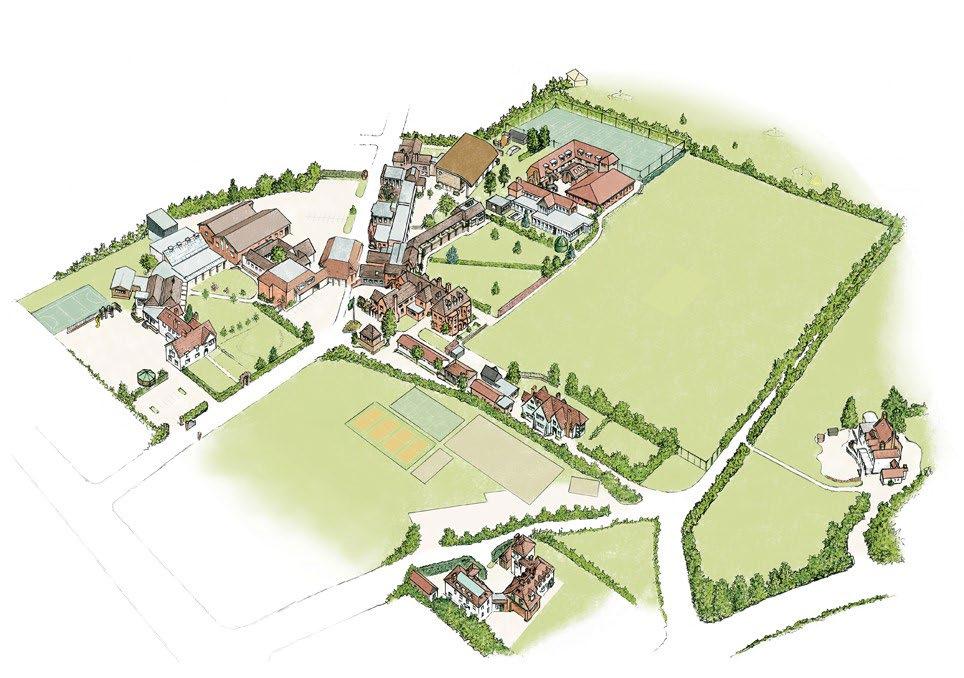
Key Contacts
Head Rich Jones
Deputy Head
Assistant Head - Sixth Form
Nat Baker
Jenny Savage
Assistant Head - Lizzie Hedderson
Pupil Development and Wellbeing
Assistant Head - Pastoral & Boarding Alistair Phillips
Designated Safeguarding Lead
Assistant Head - Co-Curricular
Head of SEND
Operations Director
ADMISSIONS DEPARTMENT
Director of Marketing & Admissions
Senior Admissions Registrar
+44 (0) 1462 650 947 admissions@stchris.co.uk
Barrington Road Letchworth Garden City Hertfordshire SG6 3JZ stchris.co.uk
Emma Roskilly
Kirsten Rockey
Simon Holmes
Rhiannon Butlin
Sarah Davis
